#but also there's the whole thing about the book itself transcending time and space and existing before bill died
Explore tagged Tumblr posts
Text
still thinking about the framing of tbob of it being like. yay!!! the twins are back in town for a visit!!!! the stan twins have finished planning out their trip to the arctic and are now packing their things + buying equipment while soos is getting used to being in charge of the mystery shack!!! they're so close to living out their childhood dream!!!
and then one day the family just hears ford firing the shotgun several times inside the house before driving off in stan's car, coming back minus a trash can, and then proceeds to spend the next few days becoming increasingly paranoid and reclusive and trying to feed a book to waddles, while muttering about how to stop youths from making bad life decisions (surely getting them into moth collecting is the answer!!!)
so of course they realise the best way to help is breaking into ford's room and stealing his shit
#the answer is mocking bill relentlessly!!!!#the fact that ford's first assumption about the book is edgy teens playing a prank :(((((#but also there's the whole thing about the book itself transcending time and space and existing before bill died#meanwhile it just turns out to be a fucked up scrapbook#i wonder if it's like the oracle prophecy and bill was completely oblivious to its existence too#i wonder how much time was just ford writing out the riddles and being conflicted about whether to try solving them or not#ford pines#stanford pines#i honestly don't think i've really seen folks talk about this part?#but also im hmm at ford's edgy pic cos that had to be shot before the kids left town#cos he's holding j3 which was thrown into the bottomless pit long before he yeeted tbob down there too#and also the family pic has dipper and wendy wearing their original hats#also soos' letter has him wearing the fez now#ford quit using old photos!!!#we wanna see y'all current looks!!!!#gf meta
12 notes
·
View notes
Text
Transitions: The Spackle of Art!
The other day I wrote some transitional passages for Galaxy Federal, connecting two preestablished scenes.
Transitional passages are like the mortar and spackle of artistic construction. They're necessary, but forever peripheral. (Though I suppose there probably are some artists who thrive in it.) For me though, writing transitional matter is an uncommon state. It doesn't come nearly as naturally to me as main scene-writing does, and I spend a lot less time doing it. When I was writing the Prelude, a lot of it also came very late in the process, as a necessity rather than a pleasure in itself. It was quite a challenge, worthy of boasting of my skill as a professional author, for me to elevate this text to make it interesting and compelling. (In my opinion anyway.)
This transcends my writing and reflects my entire personality: In composing music, I always struggle with my transitions between the prominent melodic sections. In listening to music of all genres, I almost always much prefer the main sections over the transitions. Same with reading books, watching movies, etc.
But because of its relative alienness to me, I also have a certain fascination with transitional passages. I tend to notice them, and I appreciate them when they are especially well-done. Some are so subtle and well-integrated that you can scarcely see them. Other transitions are much bigger, but necessarily worse.
Such was the space I found myself working in the other day: This particular transitional passage calls for thousands of words of text, and I obliged two-and-a-half thousand on my first pass, during which time I got to show all sorts of things happening! My highly granular, ground-level, play-by-play scenes—which comprise most of my main scenes as compared to the less common "40,000 foot narrative epic view" type—tend to flow slowly. But in a transitional passage, hours can pass in the space of a single sentence. Whole conversations can be clipped to one or two lines of dialogue. Environmental descriptions can show the progression of time rather than a moment in time. It's quite literally a change of pace for me, most of the time.
I tried to use this quality to flesh out the fact of "Cherry being a starship captain." I am greatly interested in the nitty-gritty of this; I seek to incorporate a lot of verisimilitude into the text. Virtually all editors, and most writers, would single stuff like this out as the poster child for bloated text that needs to be edited down for tightness and pacing. But I firmly reject that. I really just want to write stories about people "at the office," proverbially speaking. I think the criticism that this kind of stuff isn't interesting is true, but only provisionally: It depends upon the underlying activities themselves being boring, and/or the writer not being great at writing them.
In that sense, action and "PLOT" are a crutch that many writers depend upon to cope with limited writing skills. We've all met people in our lives who are so intrinsically interesting and good at telling stories that they could literally describe an hour of washing the dishes and we'd be hanging on their every word. We've all been there! This is a real thing.
I, myself, am not actually all that good as a yarn-spinner, bard, or anecdotist. But what I lack in a talent for gripping storytelling I hope and aspire to make up for with the stories themselves just being intrinsically interesting. I've seen other writers pull this off. If the subject matter is interesting, the writer doesn't have to be a great anecdotist.
So the question in this particular case is: Is being a starship captain...interesting?
And my answer to that is: "Yes and no, in all the ways you would expect, but to some extent it doesn't matter because no one actually writes about starship captains having 'a regular day at the office.'" The normalcy of starship captains' jobs is always being interrupted by PLOT. So it's actually quite rare to get to see a captain walking around doing regular stuff at length. That rarity gives me more room to depict realities that perhaps wouldn't be interesting to read about in every sci-fi book over and over again as a convention of the genre, but definitely would be interesting to read about at least a few times.
I put it to you that you probably don't know what a starship captain actually does in normal circumstances. You could logically deduce some of it, but have you ever really seen it play out (in fiction, obviously)? I think that would be enjoyable to read about, at least every once in a while.
Well, the transitional passage that I started writing this week definitely adds some more spackle to that curious edifice!
3 notes
·
View notes
Text
Until I Have Healed You
By Azalea Valaine
Page count : 559

Blurb:
"The truth is that of all created things, I am most fond of you."
The ruler of the Primordial Godhead – Theos’ D’Or, is the creator of the universe. He is life itself. He has one desire – a mate he has been waiting for since he set time into motion.
Haera Raehn is a battered, rogue werewolf, with a past that has left the snow of her province stained with her blood. She has one goal – stay on guard; stay safe.
The Third Member of the Primordial Godhead, Kheos Dhamma, is the roiling, burning scourge of destiny that mortals fear and despise. He has one job – to ensure the success of the love of the gods.
Theos and Kheos have been at each others’ throats for eternity. When Kheos’ angry indifference suddenly melts into worried concern about Haera’s safety, Theos can’t tell if it’s a new attempt to take his throne, or a genuine attempt to help. By the time he discerns his brother’s true intentions, it may be too late.

Review:
✨Gods. Gods. Gods✨
"𝑰 𝒉𝒂𝒗𝒆 𝒃𝒆𝒆𝒏 𝒘𝒂𝒊𝒕𝒊𝒏𝒈 𝒋𝒖𝒔𝒕 𝒕𝒐 𝒎𝒆𝒆𝒕 𝒚𝒐𝒖 𝒇𝒐𝒓 𝒇𝒐𝒖𝒓 𝒂𝒏𝒅 𝒂 𝒉𝒂𝒍𝒇 𝒃𝒊𝒍𝒍𝒊𝒐𝒏 𝒔𝒚𝒓𝒊𝒔𝒆𝒔, 𝑯𝒂𝒆𝒓𝒂.”
Wow, I’m a little in awe of this book, simply Breathtaking. I absolutely love all the side-characters, they’re amazing that I can read several chapters solely on them. The world and storyline were so mesmerizing and intriguing, I literally read the whole book in one night, I couldn’t bear to put it down.
"𝑰 𝒘𝒐𝒖𝒍𝒅 𝒕𝒓𝒂𝒅𝒆 𝒂𝒍𝒍 𝒕𝒉𝒆 𝒘𝒐𝒓𝒍𝒅𝒔– 𝑰’𝒅 𝒈𝒊𝒗𝒆 𝒆𝒗𝒆𝒓𝒚𝒕𝒉𝒊𝒏𝒈 𝒊𝒏 𝒆𝒙𝒄𝒉𝒂𝒏𝒈𝒆 𝒇𝒐𝒓 𝒚𝒐𝒖, 𝑯𝒂𝒆𝒓𝒂.”
This book is equally dark, sensual, unsettling and a little twisted with its elements. The language is beautiful, every word matters. And love! Well, it really pushes all the boundaries, it transcends time and space. The intense slow burn romance between Theos and Haera is truly amazing.
“𝑫𝒆𝒂𝒕𝒉 𝒊𝒔 𝒎𝒆𝒓𝒆𝒍𝒚 𝒕𝒉𝒆 𝒘𝒊𝒍𝒍𝒊𝒏𝒈 𝒂𝒃𝒔𝒆𝒏𝒄𝒆 𝒐𝒇 𝒍𝒊𝒇𝒆. 𝒀𝒐𝒖𝒓 𝒑𝒐𝒘𝒆𝒓 𝒐𝒏𝒍𝒚 𝒉𝒐𝒍𝒅𝒔 𝒈𝒓𝒐𝒖𝒏𝒅 𝒘𝒉𝒆𝒓𝒆 𝑰 𝒓𝒆𝒍𝒆𝒏𝒕.”
I can only imagine what Azalea has in store for the furthering and deepening of this fantastic world she has created, I'm more excited for the side characters especially Kheos and Rheos. I have come to the conclusion that nothing I write will ever give this book the justice that it truly deserves. Azalea has written such an amazing story that I am left utterly speechless, the characters!!!!! Her characters are so vivid, I can visualize every one of them without even trying. Thaos is definitely in my top 5 favorites.
“𝑯𝒆 𝒊𝒔 𝒑𝒂𝒔𝒕, 𝒑𝒓𝒆𝒔𝒆𝒏𝒕, 𝒂𝒏𝒅 𝒇𝒖𝒕𝒖𝒓𝒆. 𝑨𝒍𝒍 𝒕𝒉𝒓𝒆𝒆 𝒔𝒕𝒂𝒕𝒆𝒔 𝒂𝒕 𝒐𝒏𝒄𝒆.”
Also somewhere along the way, the book turns itself on end and becomes something entirely new and completely its own unique masterpiece. I am seriously in love with this book now. I have no doubt that the next book in the series will be even better, and I am going to lose it a little each day waiting for it to be released!
Rating : 5/5

0 notes
Photo






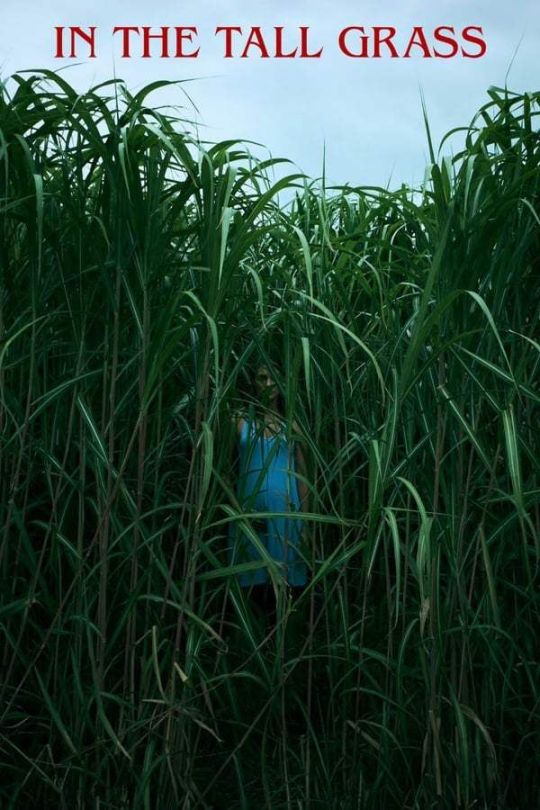

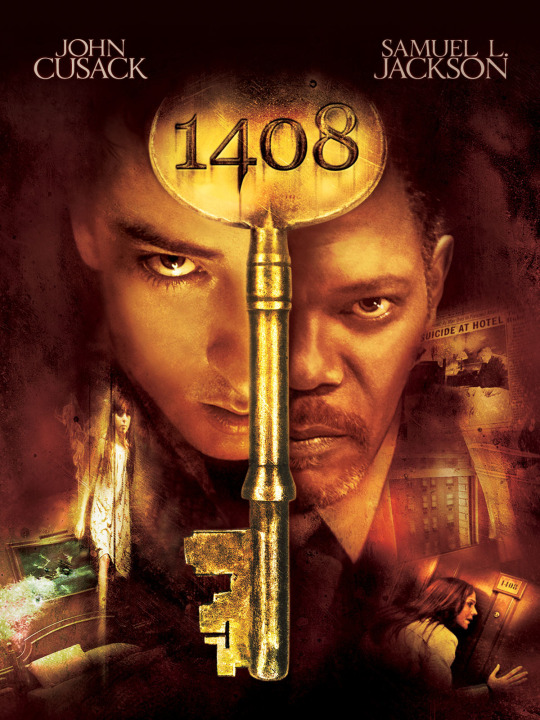

My favorite “abstract” monster movies/horror movies that feel like really good SCP’s and a non-spoiler note about each! Let me know any more along these lines! Some were your suggestions the last time I talked “anomaly horror movies” so thanks!!
Pontypool is based on a wildly different novel and a lot of people liked it more, but I actually found the movie more fun with its subtler and more focused story (basically just a small piece of the book) It is adjacent to, but is not a “zombie movie.”
Rubber is more comedy than anything else and has a strange meta angle some find pretentious. I just like that it’s about a murderous tire.
Absentia is a pretty harrowing film that involves missing children and pregnancy in its horror but also a very unique paranormal element for modern cinema.
Await Further Instructions is one I just saw weeks ago on Netflix and some people hate the tonal shift of the climax, the “silly” ending and the admittedly questionable “technology bad” kind of angle (edit: I was right the first time and that isn’t its message) but this is really one of my favorite monsters in a movie ever, and the whole thing is written just fun as hell to me.
Oculus is not about a “haunted” or “demonically possessed” mirror like some reviewers seem to think.
Autopsy of Jane Doe is technically about a classic kind of supernatural being but it’s presented in such a creative way.
In The Tall Grass is an adaptation of a King short story and “confusing” according to a lot of reviews. I did not find it confusing. I don’t think you will either? I think they just didn’t understand a movie where the antagonist is a phenomenon or location.
Possum is the least explicitly supernatural one here; the “creature” is symbolic and the real subject matter might be extremely disturbing for people who just want a spooky film.
1408 is another Stephen King adaptation and like Oculus I’ve seen reviewers who think it’s about a “haunting.” It isn’t, and the movie even says so.
Deep Dark is the closest thing in this list to just a literal “creature movie” but it’s a highly original entity who’s also just a delightful villainous character!
And FULL SPOILER synopsis for each if you want that!
Pontypool is about the English language itself becoming an infection, your vocabulary breaking down as you’re driven to a berserk state. Taking some dialog as canon and the book at face value, language itself has always been a metaphysical “organism” and now English in particular is trying to escape the confines of what it is. For this reason, infectees behave like zombies because they want to “chew through the mouth” of other people who are speaking.
Rubber has a tire just wake up one day for no reason and make things explode by shaking at them. A group of people lead by the film’s director follow the tire around and comment on events as if they’re over-analyzing an art piece.
Absentia never fully shows more than a hand and overall outline of its monsters, which are described as resembling silverfish but actually seem to be some kind of sadistic, ancient fae connected with an underpass.
Await Further Instructions is about a toxic family suddenly trapped in their home by a metal barrier and ordered around by emergency messages on their TV. Towards the end it turns out that television itself has gained awareness and wants humans to acknowledge it as master.
Oculus is about a mirror that can warp your perception of reality and has a staggeringly sick, sadistic will. A woman whose parents were killed by the mirror has devoted her life to studying it and setting up an elaborate, scientifically controlled system to finally document and destroy it.
Autopsy of Jane Doe is about an unidentified dead woman who does not seem to decay, and fights back against being examined and embalmed through manipulation of reality. She is revealed to have been executed centuries ago as a witch, but it’s implied there was nothing supernatural about her until her wrongful torture left a hatred that transcends death.
In The Tall Grass features a field that bends time and space in order to keep people trapped. The hub of the phenomenon is a massive “stone” (a brief, bizarre shot implies that it is something very different) that can invade the minds of victims and enslave them to the field’s survival.
Possum is about a man with a very, very creepy marionette puppet, and we see it move a few times, but it’s hard to say what’s real within the narrative of this movie, except that the man was a victim of childhood abuse and neither he nor the puppet are its antagonists.
1408 is in a similar vein to Oculus and Jane Doe; it’s a hotel room that can do whatever it wants with reality or its victim’s perception of reality, and it seems to have a limitless love of inflicting agony. I also like the short story just as much, and it has some moments I wish had translated to the film.
Deep Dark is about a cheap, filthy apartment where a long line of world-famous artists and inventors are revealed to have secretly found inspiration. When an unknown artist tries it for himself, he ends up in an unhealthy intimate relationship with something that inhabits the walls, speaks in a woman’s voice and provides him slimy pheromone-laced spores that intoxicate and charm other humans.
4K notes
·
View notes
Note
do u have any thoughts on the whole “tim is zapped to time prison” storyline? bc i feel like it could have been pretty interesting and a good way to bring back young justice/tim’s memories more immediately if it hadn’t been such a blatant attempt to just get tim out of storylines bc they had no ideas for his character
sorry lol u don’t have to respond i just kind of wish people talked about this storyline more? and the fact that tim lowkey became one of the only people in dc with knowledge of the other timelines (i think so at least) and nobody really addressed it?? like going into the next phase where people learn about other timelines after death metal.... tim should already know some of this stuff right?
YES YES YES OKAY LETS TALK ABOUT THIS this got incredibly long because I just have a lot to say (and i included screenshots) and i prob got a little off topic but. but lets get started anyways:
i haven’t read that particular storyline in a few months so i might be missing/misremembering some details here, but that whole ‘time prison + future tim’ thing was like. a really really interesting concept and the implications/impacts it has are a big part of why i liked tynion’s detective comics run as much as i did even with it’s flaws in characterization (such as treating tim like he was jimmy neutron boy genius and making steph..... be all ready to quit/breakaway from the team like that. the steph quitting characterization really started i think in batgirl convergence and unfortunately has haunted her since, even though pre reboot never giving up was like...... one of her defining traits. dc i hate you sometimes)
i think that one of the biggest things that bothers me about the situation is how little we saw most of the other characters in the batfamily grieve (aside from steph and some with bruce, but again the way steph was portrayed just... hhhhhh. it very much reduced her to ‘tims girlfriend’ more than i’d have preferred) but otherwise like...as far as I can remember there was maybe one line in that monsters crossover thing where dick mentioned tim was gone, jason had a single line about avoiding the funeral in rhato, i dont think they showed any reaction from babs at all until after he was back, and the most for damian I recall is at the end of the 2014 teen titans run (#24) where he looks at... a case with the old red robin uniform Tim wasn’t even wearing anymore when he died? and that just bugs me. Instead of getting to see the actual funeral we get one flashback to it way after the fact once Bruce already knows Tim’s not actually dead

But at the time when they all DID think he was dead? the closest thing we see was in that same teen titans issue (#24) there’s a memorial-type ‘sharing stories’ thing after the funeral with tim’s titans friends but.... we don’t see something like that with his family. tim is a major presence in these peoples’ lives, they are his family, when he gets sent into time prison its even SAID how loved he apparently is

its just... idk. they all thought he was dead, and if they had put more emphasis on showing not just telling how that effected EVERYONE (not just steph) in the batfam, it might have felt a lot less like they were just putting tim away until there was a story idea for him. (like obviously I know they can’t make everyone’s stories revolve around Tim, but I’d have way preferred a detective comics issue of the funeral/memorial with the family than having there only be a teen titans one, I think it would have... held more relevance & meaning... but instead they just went right into that monster crossover story instead of lingering on this)
but then the Tim story itself once it does pick up way later, with titans tomorrow/future tim coming along having that whole “tell conner you’re sorry” “who’s conner?” exchange with current tim... that opens up A LOT of things to think about, and I think was pretty interestingly done if i’m remembering correctly. future tim recognizes the timelines are different, and ya know goes off to try to change things further ("whaddaya got there?” “a gun to kill batwoman” “NO!!!!”), theres lots of fighting etc etc the good guys win as we expect, but once that’s all settled tim’s left there with this whole. thought process
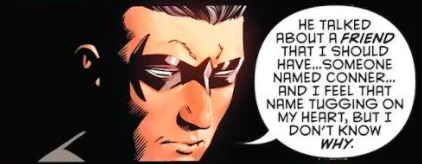
which ya know is the big indicator there’s weird timeline/reality fuckery going on (or also the read here can be that tim and kon are so connected across all space and time that their bond can transcend anything even timelines and realities and reboots... “and they were soulmates” “oh my god they were soulmates”)
ANYWAYS lets not forget that tim isnt the only one who learns about this other timeline stuff during this whole situation!
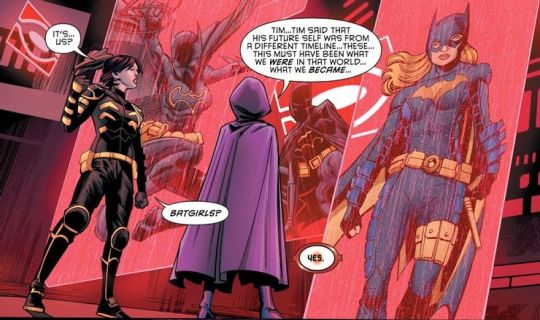
Brother Eye has records of future tim’s timeline, and cass & steph see who they used to be! and as soon as steph finds out ‘holy shit i was ROBIN and BATGIRL?’ she also desperately wants to know more! which then a bit later leads into young justice 2019 where instead of going off to college like they told Bruce they were gonna, Steph and Tim go get the help of Zatanna to see what might be going on in their brains with these timelines and weird feelings (as we see in flashback form in yj 2019 #5)
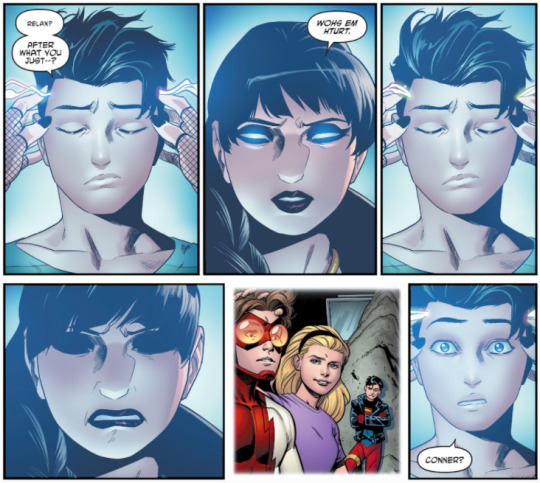
and HOO BOY DOES SHE FIND THINGS! she gets in there and finds out that oh yeah, their brains had very much so been tampered with, and with her magic she undoes some of it, by unlocking memories, and Tim finally remembers Conner! (also in case u were wondering, that panel is specifically a callback to this one from yj 1998 #17 when Cissie quit the team)
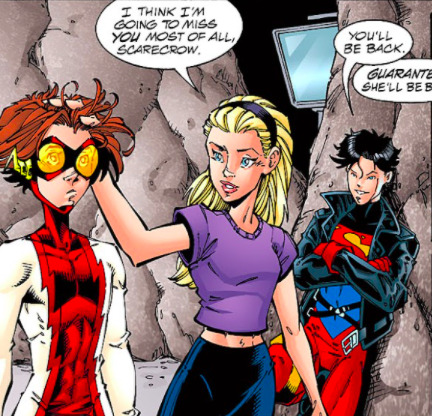
one thing that I think is weird/interesting/idk if it gets... properly addressed even, was that Zatanna also poked around Steph’s brain too and she didn’t remember everything? Might have something to do even with how Tim had been in time prison, might have taken less work from Z to open things up because of that? Who knows
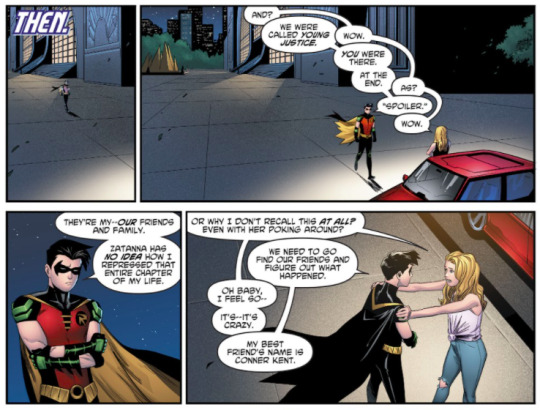
additionally i wanna call attention to how he said “That entire chapter of my life” which... leading into my next point a bit... strongly leads me to believe even though he’s remembering some things he definitely does not have ALL of his memories back (because theres a lot more than just the young justice ‘chapter’ of tim’s life that was drastically changed by the new 52 & rebirth)
BUT moving on, i wanna bring up this part from later on (after they figured out that there was a crisis that caused things in the world to change, which is why their memories/brains were messed with) in issue #16

so yeah, I think it’s indicated even though Zatanna brought back some memories and opened up his brain a bit, there’s still many holes, and some things seem more like dreams rather than memories and he’s probably unable to tell which are which on his own to some extent. (also for reference the real thing that Tim thought was just a dream is... likely yj 1998 issue #1)

So based on the things i’ve brought up here (which are the things I remember off the top of my head, I could easily be accidentally leaving shit out LMAO i haven’t fully read through any of these books in at least 3 or more months now) I think it’s safe to assume that Tim definitely has a head start on getting back his memories before Death Metal happens, but that it was by no means a complete thing. So the after effects of Death Metal are probably just gonna... be a little less drastic for him vs most other people because it was already happening, but it’ll be kinda filling in the remaining gaps?
And like you said he is absolutely one of the few people that already knew about about the timelines/the fact that these crises have happened and changed things, but pretty much all the other young justice characters are also aware that there was meddling in the timeline/that multiple timelines and alternate universes like this exist since they were all together as a group when it got explained (in like. yj 2019 #15 i believe is where most of the explaining happens) (and cass as well is aware of things to some extent because of her and steph’s interaction with Brother Eye) but the difference is that Zatanna didn’t go into everyone’s brains, so they aren’t dealing with the same memory things as Tim (and possibly Steph? because again Z DID go in her brain, she just wasn’t able to unlock all the same things as she did with Tim)
but yeah in general i SO wish this was explored more, both in canon and in fanworks (fanworks tho... that can still happen >:3c). Memories hazily coming in for Tim while Kon and Bart are able to confirm or deny things, him dealing with conflicting memories and feelings about his past as they trickle in... like I think we’ll start to see these types of things moving forward across a lot of titles with Infinite Frontier (i BELIEVE dont quote me on this but I BELIEVE the person writing Damian’s upcoming solo had mentioned in an interview that the memories coming back of the other timeline aren’t going to be an all at once thing but will be more gradual for most characters) but the fact that it theoretically had already been happening for Tim for MONTHS and we only got that one crumb indicating it in #16 of it instead of any actual exploration makes me SAAAAAAD
#Anonymous#tim drake#dc comics#meta#sam talks about tim too much#if anyone has diff thoughts interpretations im always down to discuss!#this sent me down a rabbit hole thats why i didnt answer last night it was Suddenly 1am djsjsjs#also sorry no issue numbers on the detective comics stuff but those r screenshots i already had#from my readthrough a while back or google images. so i didnt go check
46 notes
·
View notes
Text
jatp fanworks appreciation - day 3 (wips)
wip wednesday - I didn’t think I wanted to join in on this day for my own stuff considering I’ve never posted anything original for this fandom, but I think this might just be the little boost I need from myself to actually finish the wips that I have sitting around. I am peer pressuring myself and holding myself accountable by posting this - or at least that’s what I’m telling myself. Most of the past 6 mths has just been me screaming to no one in a Google Doc, so here are some things I’ve been ruminating about over the last 6 months (and if my secret agenda is to get other people to write about it so I don’t have to? Then that’s between you and me).
Everything’s under a read more because I like giving context and that usually spirals out of control!?!?
If you would like to see more from any of the below, feel free to shoot me an ask/message and I can definitely share some more! (Or you can just come yell at me about JATP in general.)
Strangers Fake Dating AU // Julie x Luke
I’m a simple person. I see a prompt, I latch onto it, and then I completely miss the entire point of the prompt as my imagination goes wild for no real reason. This really was supposed to be a super short drabble, but it manifested into a 3k+ thing that isn’t even finished.
Julie’s not really sure what she’s supposed to do now. Nothing has ever prepared her for a situation in which she’s supposed to pretend to be a stranger’s girlfriend, especially if that situation involves parents. Does she continue this ruse? Can she come up with a quick enough excuse to tell this Luke character that she actually can’t stay? What if this is just all an elaborate plan to kidnap her? Has she been listening to too many true crime podcasts? Why does Luke smell so good? Does he know how to cook? Why does his shirt not have sleeves? What-
“I can hear you thinking from here.” Her head whips up at the sound of Luke’s voice, which is now at a whisper and kind of frantic. “I just- I just really needed to get my mom off my back, so I kinda need you to pretend to be my girlfriend. Just for the night. I swear I’ll make it up to you somehow.”
Julie studies Luke’s face and it’s nearly impossible to not cave under his gaze, which can only be simply described as ‘puppy dog eyes’. She finds herself smiling back, letting out a huff, “I hope you like lasagna.” And the grin that spreads across the boy’s face is enough for her to know that he’s incredibly relieved that she agreed.
“I’m Luke by the way. Luke Patterson.”
(Okay, he’s kinda cute. And no one this cute is a serial killer. Right?)
She gives a small smile back, “I’m Julie.”
//
5+1 alive!Juke AU // Julie x Luke
Inspired by paper - LANY
This is one of the first things I ever felt the urge to write down back in September because I love exploring the idea of how two people can appear to be the perfect relationship on the outside, but are actually fighting their own demons. Especially when it comes to celebrities and people who are in the spotlight. It’s basically a 5+1 fic about the moments from other people’s perspectives who happen to orbit around Julie/Luke that all revolve around paper. My outline for this is so long because I can’t manage to narrow it down, and there’s zero cohesiveness but I do have little things jotted down.
“Hey little man,” Luke’s knelt down to match his 5 year-old height, and a hand extends out to him for a high five, “What are you doing here?”
His eyes flicker to the left, towards his own apartment door, where his mom is giving him an encouraging nod. “ I- I just wanted to-” he stutters and finds himself looking at his feet as he shuffles back and forth on the spot. “I- I drew you guys something!”
He shoves the paper out towards the older boy in front of him, but doesn’t look up.
//
Reincarnation AU // Julie x Luke
I had a random thought in December about how magical it is that Julie and Luke are so tied to one another that their love transcends time and space, which will always lead them back to one another. I remember reading a book a long time ago about how the main character is fated to die at a certain age, and that kind of sparked this little idea. I can’t bring myself to actually plot out every single timeline right now, but I did manage to write a little bit.
It will never be as complex as Rosie’s idea and all the wonderful additions in the link here, and I don’t really plan on it being anything more than a small idea. But I really do still think someone should write some sort of reincarnation AU cause I’d hop on that so fast!!
“Okay- that’s not- Luke. You seriously just ran away?”
“What was I supposed to do Alex? We all know how this ends.”
His friend looks at him, face painted in understanding and he sighs, “Yeah. Yeah, we do.”
Because it’s true, Alex does know, so does Reggie and Bobby. Most importantly, so does Luke. It’s the exact same tragic love story every time.
Call it a curse or fate or destiny. Maybe it’s because Mercury is in retrograde. Whatever. It always ends the same way - with a heartbreaking goodbye, a whisper of the promise that they’ll find each other again, and the possibility of a happy ending. He’s said the same goodbye at least 734 times, but it’s not like he’s counting or anything. Fuck the universe and its mystical ways.
//
Competitive Alex // Alex x Willie
No real thoughts or reasons for this other than I just think I self-projected my need to play board games with people in real life into a fic. And maybe a little bit of my competitiveness onto Alex and then threw in Willie because I think he would be able to handle it while also finding it endearing. I also have written nothing about the actual competitiveness, it’s just 2k words of Alex crushing on Willie.
“Wait,” his eyes dart between the three boys, “You both know Willie? How come I’ve never met him?”
His roommates look at each other, and there’s a smirk on Luke’s face when he says, “Actually Alex, I think you have. Remember that time you got really drunk after one of our shows?”
Oh no. He really hopes that it’s not the time he’s thinking of, so he tries to sound nonchalant. “You’re going to have to be more specific, Luke.”
“The night we played at that tiny bar at the edge of the campus! We got paid in those tiny colourful shots?” He doesn’t really know where Luke is going with this, so he’s slowly nodding along. “And you were super upset that the hot dog vendor at the end of the street was closed?”
//
Dear Julie, Love Mom series
I made myself sad with this thought when I first watched the show and was talking to my friend about how I think that Rose would’ve left messages for the Molina family, especially when we found out that Wake Up was actually from her mom. I wrote a bigger explanation for it here.
Anyways, I started with the one for Julie’s wedding and it kind of became an 8k monster with three different POVs?!? As much as I love how I wrote this, I feel too unsure about my writing to share it in full, so you will get carefully selected looks alkfe. (I’m also kind of stuck on some of the more emotional scenes and I may or may not have procrastinated by photoshopping a moodboard for it.)
Excerpt 1 (Julie POV): A look into where I’m going with this whole letters from Rose thing.
The key clicks into place, and with a turn, the latch falls open. She’s not sure what she wants to find in the box, and she’s too scared to think about it really. All she knows is that this was the sign from her mom that she was waiting for all week, and in true Rose fashion, her mom had managed to give it to her, even if at the last second. Her dad turns the box to face Julie, and gestures to her to open up the lid.
Tucked inside is a VHS tape, the words ‘For Julie, on your wedding day’ written in her mom’s cursive on the cover. Some loose glitter and confetti fall back into the box as she reaches in to pick up the tape and turn it over in her hands. There’s a little purple butterfly etched on the back, the same one that’s been drawn on all the other messages that her mom had left her. Her finger automatically finds its way, tracing the shape of the small doodle.
“Do you want me to leave you alone, mija?”
Excerpt 2 (Julie POV): This part has absolutely nothing to do with the main plot of the story, but it self-inserted itself into this fic after @tangledstarlight and I talked about You’re Still the One by Shania Twain being their first dance. This whole scene came to me at 4am one night and might be the most self-indulgent thing I’ve ever written.
They knew that when they had asked Reggie to be in charge of the first dance performance, that they (and Alex) weren’t allowed to veto any of his ideas. Luke had warned Julie that that would be a mistake, but the giddiness that radiated off of Reggie when she had told him he could have free reign was worth it. She just hadn’t thought that he would actually take it to heart and run with it.
Sure, they had chosen You’re Still the One by Shania Twain as their first dance song, and sure it was more or less a country song, but she didn’t really imagine that she’d be staring at her adoptive brother, Carlos and her Dad wearing cowboy hats and boots at her wedding. They had somehow managed to ditch their Flynn-approved suit jackets and were sporting a taupe-coloured suede-textured vest over their dress shirts. If she looked closely, she could see that they had somehow also found some gaudy looking bolo ties with a matching set of ornamental clasps to wear. When she envisioned her wedding, she really didn’t expect that her first (public) dance as a married couple would be a full-on Western themed occasion. The only exception was Alex, who had settled on his cajon in the back, still in his pink suit, eyes rolling when she met his gaze. But even she knew how there was no real annoyance in the blonde’s reaction or else he wouldn’t also be wearing one of the tacky ties around his neck as well.
“I’m gonna seriously kill him.” She hears Luke grumble under his breath, only low enough for her to hear. But she’s still too busy giggling to actually be mad, and she knows that Luke isn’t really going to kill Reggie. At least she doesn’t think so.
Excerpt 3 (Luke POV): Idk man. My mind went “What about Luke?” and I said “You’re right!! What about him?!?”
He doesn’t realize that he’s just been silently staring at the woman in front of him, until a gentle voice breaks him out of his thoughts. “Why are you looking at me like that?” Julie’s peering at him from under her eyelashes, a curious look on her face.
“You just-” he gives a little shake of his head, trying to come up with the right words. He wants to tell her she’s beautiful. Stunning. A wicked beauty. But she’s more than that - she’s almost angelic. “I can’t believe you’re my wife.”
“Luke, we’ve been legally married for like, a whole year.” Her lips are quirked up in a grin, amusement in her voice. “You’ve only just realized that now?”
“That’s different.”
“Yeah? Different how?”
This feels a little strange to post and a little like my inner self seeking validation but let’s not talk about that.
Kskssj anyways present me @ future me: finish one of these because writing has been really cathartic for you and you didn’t think it would bring you so much joy!!!
#gotta tag this so that it doesnt ever show up in any tags on tumblr.#i like that what got me to post about my writing was a fanworks appreciation week. but i will say that a couple weeks ago when i was feeling#extra good about my writing. i made a promise to myself to post smthg for the 6 mth mark of jatp and that kinda got backtracked because of#my requirements to be an adult and my general insecurities about putting out content that is mine for the works to judge sjsjsj#so this is me making it up to myself by sharing some things.#thank you rosie for indulging me in my ramblings. you’ve really given me confidence in my work even tho you’ve never read anything of mine.#just know I APPRECIATE YOU A LOT!!!!#i hope you dont mind that i tagged you!!!#anyways this is gonna get thrown into my queue for wednesday and whenever it posts is whenever it will post.#i also typed this on my phone (i DO NOT RECOMMEND IT) so sorry if the formatting is janky. i didnt wanna give myself time to second guess#myself and end up not posting it. sjjs#jatp fanworks appreciation week#sometimes i write#personal#<- need to come up with tags for myself welp#sunset queue
16 notes
·
View notes
Note
For the SOULMATE Alphabet prompt, can I ask E or ESP for Jack Dalton/Angus MacGyver please? All these prompts sound like so much fun!
[be gentle with me it’s been like. years since i’ve written these two. i’m being dramatic it’s only been three months.]
There’s one reason and one reason only Jack and Mac would allow themselves to be apart for long times at long distances, and that reason was something that even all of the infinite science in Mac’s brain, all of the infinite wisdom in Jack’s heart couldn’t even explain.
They figured it out when they had parted ways after Lake Como. Both had been too injured to realize that the pain they were feeling—on top of what they were already feeling—was each other’s. Mac thought the pain in his head was his mind overworking itself trying to reconcile Nikki’s (supposed) death. Jack thought the pain in his chest was the early signs of a heart attack, not uncommon in his family.
They hadn’t seen each other in nearly a month. Mac was finally out of the hospital, Jack was at his apartment. Jack didn’t quite know what to do, give the kid space or hover over him as an emotional Overwatch support, but he ultimately figured that Bozer would tend to him and that he would just pop by for a visit—which never happened because every time he thought of going, there was a forcefield of guilt that kept him from passing through the unlocked threshold to Mac’s house.
Mac, meanwhile, thought it was bad enough that he lost Nikki, he didn’t want to lose Jack, too. His fingers would constantly key over Jack’s number in his phone that he had memorized forwards and backwards. But he didn’t want to bother him. Figured that he was busy with a new job cause the older man was always working non-stop, as much as he would “complain” about the mundaneness of a nine-to-five job; all the paperwork and meetings and lack of an appropriate amount of sick days or whining for a raise, he knew that really Jack just wanted to keep himself busy, occupied.
Or otherwise he’d end up where Mac thought he was in that moment, on a couch, wrapped up in a bathrobe.
“Jack?” Mac gasped himself awake from an almost-nap. He sat up and threw his hand to his side, expecting it to land on Jack’s shoulder, or knee, or just any part of his body that would elicit some witty remark, “the lights go out in those bright eyes of yours, hoss?”
His hand didn’t touch anything. But he definitely felt Jack there with him, on his couch. Smelled him, too. And he was overcome with some strange...sadness. Remorse. It wasn’t a foreign emotion to him at the time, so he had sort of shrugged it off, thinking his mind was playing tricks on him, that the pain meds were too strong.
And then Jack woke him up with a phone call.
“Were you just at my house?” his tone was laced with the usual paranoia that came when anything was out of place at his apartment, but there was an odd sort of seriousness and urgency that Mac felt, too.
“No. Did you come here?”
“No, not since I drove by last night to drop off some pizza and beer.”
“That was you? Why didn’t you come in?”
“Boze said you were sleepin’ and I didn’t wanna wake you.”
“Well...you woke me up now,” Mac smiled though he knew Jack couldn’t see it.
Yet in a way, he could.
“What is going on here, hoss? It-it’s like you’re sitting right in front of me.”
“I don’t know. You wanna come over? Maybe we can sit by the fire and try to figure it out together.”
“Aight. Be there in ten.”
Jack lived fifteen minutes away.
They sat by the fire and once they passed by the awkward small talk they were able to properly catch up; though Mac didn’t have much to offer with the bed rest he had been sentenced to, but was pleased to announce that he would be beginning his rehab. Jack, meanwhile, got a gig being a stunt coordinator—disguising the fact with a cough that he was also partaking in some of the more dangerous stunts himself.
It was good that it happened, a brief reunion before a more permanent one that came months later when they got to go back to work together, the small steps leading to a true recovery of a slightly tarnished friendship in the face of a failed mission.
It wouldn’t be the last time.
They don’t feel anything unexpected, again, thinking it was just their own emotions they were waving through and the yearning for each other’s presence, but one of the first times they were separated, it was stronger than ever before.
And it wasn’t even that big of a separation. Just a few feet. A couple more feet. Maybe the length of a basketball court, at most. Mac moving backwards. Jack standing still. Jack could feel the panic rising within Mac as he scrambled to defuse the bomb Jack was standing on. Mac could feel the sheer dread and terror pouring out of the sweat beads on Jack’s skin.
The stakes hadn’t been so high since Mac had to disarm a bomb within an impossible amount of seconds back at the sandbox—and in hindsight, he can’t help but wonder if that’s when they had formed this new sort of...bond.
Jack must have figured it out too, because the next time it happened, just a week or so later, it came after Mac had been taken and drugged by the cartel. Jack was in full on rescue mode, dressed from head to toe in tactical gear—but he had to remove the helmet when he felt like he had some sort of mask smothered on top of his face. And then he felt lightheaded. And then he felt...woozy.
He pushed through it to save Mac—and in seeing Mac the odd sensation had washed away but when Mac told him that’s exactly what he felt when he was put under, the pieces were put together in Jack’s head.
“What kind of Vulcan mind-meld shit is this!?”
“What are you talking about?”
“It’s like we’re getting into each other’s heads, a-and feeling each other when we’re apart.”
“You can admit it Jack, you just miss seein’ your sunshine boy,” Mac had waved him off with a poor imitation of his accent.
“I’m serious, buddy this is...this is real. I-I don’t know how to explain it but it’s like we’re...we’re…”
“Soulmates?”
“Yeah! That’s the word.”
“How romantic.”
Jack couldn’t help but feel slightly hurt by Mac’s downplay of his emotions, their emotions over their new transcended level of connection he never thought he would have with another man, let alone another person in his life.
But Mac would soften when his emotions got cranked to eleven.
It was their first real argument since the Sandbox. Jack tracking Mac down to Paris—which, with this new sixth sense of being able to feel Mac wherever he was when he wasn’t with Jack, he didn’t need to work as hard but he still explained how easy it was to track him down, even without their newfound “special powers,” as Jack claimed them to be—and beyond the confusion he was secretly pleased to have such an ability, harkening back to his childhood days of reading comic books and jumping off couches with a bedsheet cape on his back.
They both felt each other’s resentment, each other’s anger, until Jack calmed down when Mac called an apologized. He let Mac’s voice go to voicemail, but followed his call like he was lured by a siren.
Even though he tried to joke about a “groveling apology” that he knew Mac wasn’t actually going to give him despite the actual upset he had felt and truly wanted to apologize for to Jack, Jack entered the house knowing something was wrong.
Because he couldn’t feel Mac at all. Couldn’t feel him joking around with Bozer. Couldn’t feel him lost and searching for a deadbeat father who abandoned him—a sensation Jack didn’t quite understand until he felt Mac reliving it in his worst nights. Couldn’t feel him happy to be with the Phoenix family.
Mac’s house was as empty as Jack felt, and he was on the verge of losing it like never before—until he felt a cold shiver creep through is body. Felt a sharp prick, felt like his body was being pumped and drained at the same time.
Felt fear mixed with anger mixed with...vague...intrigue and the last time he felt it, Jack was at the mercy of a small red dot boring into his chest while Mac played the most dangerous game of cat and mouse.
And this time, he was the mouse.
“My spidey-senses are all telling me the same thing...It’s Murdoc.”
He hoped and prayed that he could somehow ease Mac’s terror with his own determination to find him. He swallowed down his tears, swallowed down his guilt for the sake of giving the kid some sort of hope with a forced sense of confidence that he would find him in no time.
And no time is exactly what he felt. What they both felt. Jack’s confidence turned to confusion when Mac no longer felt trapped, but instead...lost. And paranoid. Even more paranoid than Jack himself.
So lost that even when they physically found each other, it still seemed like forever until they emotionally found each other again, with more and more separations, more victimizations on their more deadly missions with gunshots and electrocutions and gas chambers. Fits of inexplicable rage and jealousy as they explored other interests besides each other. Odd sensations of loneliness when they weren’t working together.
Even when they were actually trapped together in Mac’s house, sitting on another bomb, it took them a whole episode of reminiscing how they got together in the first place that made them realize how no matter how often they would be lost from one another, they would always find each other, even in their worst moments.
And it was after that near miss they both exchanged real apologies. Mac admitted that perhaps this “mind meld” was real after all. Jack said “having you stuck with me ain’t so bad after all. Toldja I’m never gonna leave you, there’s definitely no getting rid of me now.”
“But...what’s going to happen when...one of us dies?” Mac didn’t even want to ask it. Didn’t actually even say the words.
Jack asked the same thing when he was prematurely laid to rest in a burning coffin, descending into hell and screaming for Mac both in the literal sense and the emotional sense—so much so that Mac could hardly take it—he felt like he was on fire and oh god, he actually was as he put his hands on the burning wood and freed Jack from inferno.
“Being burned alive...was always curious,” Jack breathed, putting a hand that oddly felt ablaze on his chest, while Mac danced on figurative hot coals.
“You’re insane, man.”
“I don’t think death is the end,” Jack answered him finally, when they were being wrapped up by the paramedics.
“How much smoke did you inhale?” Mac almost laughed, confused as to what he was referring to, thinking he had some sort of existential realization on the precipice of death.
“But wh-what if when one of us dies...the other will too? Kaboom-kaboom,” Mac continued the conversation after a particularly rough day spent in the war room with a beaten, sunken black eye while Jack ran around pretending to be a lone wolf yet he was wrangling up the pack and doing a favor by helping out his daughter’s real father, the conflicting emotions of which didn’t ease Mac’s troubles, either.
“Told ya, that won’t be it. There’s gonna be something after kaboom. For both of us.”
“Then why do you always fight so hard for us not to explode?”
“Cause I can’t let you have too much fun when you’re dropping those improv-bombs to get us out of sticky situations. There’s still a few things I wanna do before I move on from this world.”
“Right, your bucket list,” Mac smiled.
“Exactly, hoss. And what’s say...we cross another one off now?”
They were interrupted, as always, by an emergency call that revealed the truth about Mac’s father, and a falsification of how they had been brought together.
“Who do you think pulled the strings to pair you two together in Afghanistan?”
Bullshit. And Jack made a point of pointing that out, and how dare he even make the implication that even if things didn’t work out between Jack and Mac, that there would just be another Overwatch put in his place, and another, until Oversight saw fit that his son would be taken care of like he never had done for him before?
Needless to say, there were a lot of emotions, conflicting ones at that—even Jack himself was torn between sucking up to the boss but also wanting to punch him in the face, and do minor things like refuse handshakes, accidentally trip him, anything to just...annoy him without a fireable offense, per se.
But when Mac left the Phoenix, he may as well have gone, too.
He still doesn’t know why he didn’t. Was it some sense of duty to protect the remainder of the pack? Was it the same hesitation he had when Mac took his leave of absence after Nikki’s death, wanting to give him space but still wanting to suffocate him at the same time?
Was it fear that one day, Mac would walk away from him, too?
While the separation was brief, only a few months though it felt like years—especially when Jack felt the length of Mac’s hair on his own chin that allowed him to measure the actual length of time that had elapsed, when they came face to face again it still felt like they were worlds apart.
Because Mac abandoned his family.
Mac abandoned Jack.
And in what godforsaken world would that happen?
The same world where Jack would do the same almost half a year later.
“NO!” Mac shouted, rising from another cold-sweat nightmare.
Jack laid beside him, startled awake.
“Everything okay, hoss?” Jack whispered.
“Just...just...had a bad dream,” Mac whispered back.
They would keep their voices low, but their emotions high. There were certain things that just had to be said to be understood as felt between them.
“I missed you,” Mac gulped.
“You know I’m right here, don’t ya?” Jack laughed from his own bed, Mac felt a gentle scratching at the back of his head.
“I know. I know you’re here, it’s just…”
He turned his head, he didn’t even know why he was whispering, the house had never been so silent before. No snoring Bozer. No Jack strumming the guitar on a restless night. No keys clicking beneath the speed of Riley’s rapid fingers. No phonecalls from Matty.
“You’re not. Not even alive.”
“Who in the hell told you that?”
“The...the army.”
Mac’s phone rang, he answered without even looking at the number. The ring was for a video call, so he lazily pulled the string of his bedside lamp.
Jack was on the other side, soft fauxhawk and subtle stubble tracing the start of a beard on his face.
“My God, what fucked up dream did you have, man?”
“The kind that lasts forever,” Mac mumbled. “That felt...too real…”
“I turned down the Kovac mission, you remember that, right? The image was fake. Just a taunt. The broadcast orchestrated by Murdoc just to dick around with us again.”
“I know, I know it just...I can’t help but wonder what could have...could have happened if you…”
“You gotta stop beating yourself up so much, kid. I’ve told you, over and over, this ain’t one of those ‘you hurt me, so I’mma hurt you’ sort of games. We don’t do that manipulative shit.”
“Jack, I left you—”
“You left the Phoenix. I stayed. My choice.”
Jack suddenly felt the corners of his eyes burn. The corner of Mac’s eyes burn.
“I wanted you to come with me.”
“I know. And I wanted to.”
“I know,” Mac swallowed. “I...I felt that you did but...why didn’t you?”
“You walked away that day but you didn’t walk alone. I was there with you the entire time. You know that.”
“But you weren’t!”
“You’re right. You’re right,” Jack shook his head, squeezing his face. He waved his tongue over his lips, Mac suddenly felt freshness over the chapped flesh that was trembling as he held the tiny screen of Jack in between his hands.
“I...I knew how you felt, being abandoned by your Dad...Cause I did that to Riley.”
“You didn’t...abandon her—”
“Then what would you have called it?”
It was a question Mac didn’t have an answer to.
“Regardless, I think it’s safe to say that you’re not the only one with abandonment issues, I’m just...on the other side of the spectrum. Worlds apart from the pain you musta felt when dear ol’ Dad leftcha and I shouldn’ta tried to push you back together without thinking how you might have felt—”
“Jack, Jack, it’s fine. I-I know you just...you had good intentions. Cause of what happened to your Dad.”
Jack nodded, wiped a hand over the running nose that Mac felt, though his was dry.
“And anyway, I just. I was scared, I guess. Didn’t know what to do. Hadn’t been on that side of the coin before. It may have hurt you but it...it hurt me, too.”
“I know it did. And I’m sorry.”
“I’m sorry, too.”
“So...where do we go from here?” Mac asked, clearing his throat.
“Doesn’t matter, really. Cause no matter where you go, where I go, where we both go...We have each other.”
Mac felt Jack’s touch, though it was a poor substitute for the real deal, as he closed his eyes and envisioned him sitting next to him, his arms wrapped around him, hugging him to his chest.
“Forever,” Mac sighed, and Jack smiled as he felt the reassurance that while it had been stretched and twisted and tested, their bond would never be broken.
Not even in a death that Jack oddly felt he had just narrowly missed by some sort of guardian angel watching over him.
#nonny#macgyver fic#macdalton#angus macgyver#jack dalton#mk.op#mk.fic#ya know if a certain thing didn't happen in canon this fic would have ended a lot differently but i just#i couldn't#only happy endings for jack from now on i don't make the rules#though i know i really have no right to be here anymore lol
13 notes
·
View notes
Text
ISLAM 101: Spirituality in Islam: Part 93
God and the Truth of Divinity
The sacred term Allah (God), which is also referred to as the Word of Majesty or the All-Supreme Name in the sense that it is the Chief Divine Name comprising all other Names, is the proper Name of the All-Majestic, All-High Divine Being, Who introduces Himself to us with His All-Beautiful Names and draws a frame in our minds with all His Attributes of Glory so that we may have knowledge of Him; He is the All-Sacred One called by all His Names and the All-Glorified One described by all His Attributes of Perfection, and it is He Who is the sole, peerless Sovereign on the Thrones of Divinity and Lordship. As also stated by Sayyid Sharif al- Jurjani,[1] the all-blessed word of God is the proper Name of the Divine Essence as God, (from the viewpoint of His absolute Uniqueness and His total detachment from the created). According to the scholars of the basic principles of the Religion and the religious methodology, Allah (God) is a proper Name particular to the Divine Essence exclusively. Known also as the Name of Majesty and the All-Supreme or Greatest Name, this all-blessed Word is particularly mentioned as the Greatest or All-Supreme Name.
All the other Names belonging to the Divine Being are descriptive names or the names or titles that function like attributes, while the word Allah (God) is the Name of His Essence (Dhat), and comprises all the other Names directly or indirectly. That is to say, if a person declares their belief with the expressions such as “There is no deity but the All-Holy and All-Pure,” or “There is no deity but the All-Compassionate,” or “There is no deity but the All-Glorious with irresistible might,” and so on, they have not declared their belief properly, as none of these Names wholly designate the Divine Being, Who is known by all His Names and recognized by all His Attributes. One who declares their belief only with such expressions knowingly or unknowingly attempts to restrict the infinite sphere of Divinity and Lordship to the areas of the manifestations of the Names the All-Holy and All-Pure or the All-Compassionate or the All-Glorious with irresistible might, thus trying to make the infinite finite or the all-encompassing encompassed in one respect.
The All-Majestic, All-High Being Who is called by the all-sacred Name God[2] is the unique source of the truths of humanity, the universe, and things, and their ultimate, unique origin and ultimate, unique, primary cause. He is the Necessarily Existent Being Who exists by Himself. All our studies of the outer and our inner worlds demonstrate this fact. There is not a single thing in the universe that does not have multiple indications of the All-Sacred One Who is called by the Name of Glory, God. It can be said that the All-Sacred Name God exists inscribed both on the face of every thing and being and on the visage of the universe as a whole. However, this truth is more manifest and more clearly eligible in the physical and metaphysical face of humanity. As Imam ‘ Ali[3] said, a human being does not comprise a small, physical body; a human being is the miniature, the most precious copy of the whole universe; the human contains the entire contents of the universe and bears witness to the Divine Being as loudly as the entire universe. With all our states, we human beings demonstrate the All- Initiating; with all aspects of our lives we exclaim that we are dependent on Him. With the outer and inner dimensions of our existence, we proclaim Him.
It is utterly unreasonable, contrary to the perceptible reality, and an unfortunate deception in the name of a scientific approach not to attribute existence, including humanity and the universe, to the Divine Being. Any existence which is not attributed to the Divine Being is groundless, meaningless, and void; any knowledge or sciences that are not connected to Him are mere delusions and illusions, any studies or analyses that do not lead to knowledge of Him are fruitless and in vain, and discussions or conversations that do not generate love of and closeness to Him in the human consciousness are useless.
It is a fact that all existent things tell us about Him with countless tongues and that the human conscience always reminds of Him with profound sensations, perceptions, and inclinations particular to it. Whenever with our physical or spiritual sensations we turn to this world of exhibition—the outer world, this book of existence, and our inner depths, we always listen to melodies about Him and are aware that we subsist by Him. God is an All-Transcendent, Peerless Existent One Who expresses Himself with everything He creates and Who makes His existence felt through our consciousness with countless tongues, and thus reminds us that He is ever present everywhere, despite His absolute freedom from time and space. All visible and invisible realms of existence loudly proclaim His Divinity and Lordship, telling us that He is worshipped because of His Being. God has absolute right to be worshipped and is rightfully besought due to His being God. For this reason, worshipping Him with praise, thank, exaltation, adoration, glorification, and devotion is our duty and His right.
As for the false deities which humans manufacture and worship, they can never be God or be substituted for Him. Humans have deified the sun, the moon, stars, seas, rivers and so on, and worshipped many false, artificial, fabricated deities, adoring thousands of fleeting, death-bound and essentially impotent things or beings. By following these and offering worship to them, human beings have actually disrespected their own selves, their spirits and their essential nature. When they have rejected them all and turned to the Absolute, True Worshipped One, they have been saved from being debased beings and discovered their own selves through the values God has bestowed on them.
Since whatever human beings have worshipped other than God has no existence by itself and owes its own existence to God, it has emerged as the product of misguided thought and has in turn disappeared with sound logic and reasoning. Misguided thought and false belief, which have appeared one after the other, have also disappeared and been forgotten one after the other, and the final say has always remained with the All-Sacred Being, Who is absolutely free from any phenomenon that can be attributed to the created, such as coming and going or appearance and disappearance. Even though some false deities have temporarily dominated the minds of a great many people and polluted them over the course of history, the human innate recognition and admission of the Creator, the True Worshipped One, which is regarded as the inherent riches and depths of human conscience, has driven away all products of illusions and delusions; as a result human beings have turned to the All-Majestic, All-High Being, Who is the Owner of the All-Beautiful Names and All-Exalted Attributes. They have turned to Him once more after every epoch of misguidance because there is no other source of power or riches that can support or satisfy the human consciousness other than Him. Anything or any being which cannot meet this great, intrinsic need of humanity can never be deserving of worship and cannot be a deity. And there is no question that such a being is not deserving of worship, which is absolutely due to the All-Sacred One called by the All-Beautiful Names and described by the All-Sacred Attributes; indeed, they cannot even be intercessors between Him and humans.
Neither Divinity nor Lordship ever admits a partner. The One Who has the absolute right to be worshipped is One and Unique. The different events, states, and circumstances that we observe are results of the different manifestations of God’s different Names and Attributes. The truth of the absolutely True One or the Ultimate Truth is free from whatever is related to quality or quantity. Moreover, He is neither a substance nor something accidental, but is absolutely free from all features and defects that are particular to corporeality. In the following poem in which he portrayed the creeds of Islam, the respected Ibrahim Haqqi of Erzurum expresses this point very beautifully:
There is no opposite, nor peer, of my Lord in the universe; He is the All-Transcendent and exempt from having a form. He has no partners and He is free from begetting and being begotten; He is Unique, having no equals— these He mentions in Suratu’l-Ikhlas. He is neither a body nor a substance, nor is He an accident,[4] nor of matter. He does not eat and drink, nor is He contained by time. He is absolutely free from change, alteration, and transformation, and from colors and having a shape as well— These are His Attributes in the negative. He is neither in the heavens nor on the earth; Neither on the right nor on the left; neither before nor after; He is absolutely free from any direction. So He is never contained in space. As the respected Ibrahim Haqqi says, God is neither a body nor a substance; nor is He a compound or a composite, a divisible being, or a part, nor does He have a form or shape or any other feature that is attributed to the created. He is the First, the Last, the All-Outward and the All-Inward—He is the All-Inward, more inward than anything inward in His manifestations, and the All-Outward, more outward than anything outward in His being hidden. As He has no physical contact with anything in His Acts, He is also exempt from having or using any instruments in pronouncing His will or decrees.
We know Him by His hundreds of Names, such as the All-Merciful, the All-Compassionate, the All-Unique of Absolute Oneness, the Eternally Besought One, the All-Independent Single One, The All-Living, the Self-Subsisting (by Whom all subsist), the Eternally Existing One with no beginning, the All-Powerful, the All-Knowing, the All-Hearing, the All-Seeing, the All-Glorious with irresistible might, the All-Compelling, the All-Gracious and All-Beautiful, the All-Majestic, the All-Great, the All-Generous, the All-Pitying, the One Who has exclusive right to all greatness, the Divine Being, the Master, the Sovereign, the Lord, the All-Wise, the All-Speaking, the Creator, the All-Providing, and so on; we know Him by his dozens of Attributes, such as Life, Knowledge, Hearing, Seeing, Will, Power, Glory, Wisdom, Grandeur, Compelling, Being Eternally Existent with no beginning, Speech and so on. However, we can never claim that We know or that we are able to know Him perfectly; rather we must sigh with the admission: “We have not been able to know You as knowing You requires, O the All-Known,” and seek refuge with the consideration: “(The admission of one’s) incapacity to perceive Him is perception itself.” God cannot be perceived or comprehended for He is the All-Encompassing One impossible to be comprehended. Therefore, claiming that He can be comprehended means claiming that the One Who is the All-Encompassing can be encompassed at the same time, which is clearly a contradiction. Furthermore, all the Names that are derived from certain verbs which express His Acts are not sufficient, individually or collectively, for us to be able to perceive His Essence. Logic and reason can attain knowledge of the Maker of Glory in the shade of the All-Beautiful Names only to the extent that He wills and allows this. This is all of the knowledge we can acquire concerning Him. How well the famous German poet said:
Whatever we say about Him, perception of the Essence of the All-Holy Creator is absolutely impossible. Human beings can only have some ambiguous feelings and conjectural ideas about the Divine Essence. We continuously feel and experience the existence of God both in our spirits and in nature. Therefore, what does it signify whether we know His Essence or Essential Nature or not? Even though we mention God with hundreds of Names and unique Attributes, our descriptions will fall far short of expressing the truth. Seeing that the Supreme Existence, Which we call Divinity, expresses Itself in multifarious manifestations —not only in human beings but also in all major and minor events and states in the universe and the rich, restricted bosom of nature—then to what extent can human description of such a Being be sufficient?
We must be utterly respectful of Him and self-possessed on our account. This must be the reason why both the greatest of theologians and many Sufis have preferred mentioning God with the pronoun “He.” For there is limitless profundity and comprehensiveness when one avoids describing Him with any Attribute or Name. The pronoun “He,” free from the restriction of any specific Attribute or Name, is a mysterious word which comprises all of His Majestic and Gracious manifestations, His All-Beautiful Names, and His Attributes of Glory. It must be because of this comprehensiveness that, provided we refer to Him by the word “He”, there are those who regard “He” as being God’s All-Supreme Name. I think it is more proper to regard it as the All-Supreme Name in expressing His Unity in the fullest terms possible.
When we consider the Divine Being from the viewpoint of His Uniqueness or absolute Oneness (ahadiya), we mean or refer to the Pure Essence without taking His Names or Attributes into consideration. When He is approached from the perspective of His Unity (wahidiya), He is considered together with His All-Beautiful Names and Attributes of Glory. At this point, human consciousness considers God along with all His works, Acts, Names, and Attributes; this means sensing the sphere of His Lordship.
Calling the rank of the truths of True Existence the sphere of Divinity is because this expression refers to the Necessarily Existent One as the All-Holy, Pure Essence. The All-Supreme Name Allah (God) is the proper title for this rank. Divinity in this sense is the title of a transcending truth that is observed on account of Its works and which is known but cannot be encompassed with Its decrees, judgments and principles. Our knowledge and perceptions concerning Divinity consist only of some of Its characteristics. This knowledge is never sufficient to attain complete knowledge of this sphere, for there are so many other exalted Attributes about Which we cannot have knowledge; complete knowledge and comprehension of Divinity requires knowing all of these Attributes and this is not possible for human beings to achieve.
From another point of view, on account of the vastness of Its manifestations, Divinity also encompasses the decrees, judgments and principles of the areas of manifestations that belong to the spheres of Divine Uniqueness or Oneness and Unity, in the sense that every thing or being is given its due. Just as all universal or particular bounties and favors pour forth from that sphere, so too are all thanks given and all acts of worship done in return for those bounties and favors directed to it.
Furthermore, Divine Uniqueness and Unity have another aspect which is related to the All-Holy, Purely Divine Essence. On account of Its mirror in which It is reflected, Divine Uniqueness or absolute Oneness has been expressed as: “God was and there was nothing else besides Him,”[5] while Divine Unity has been interpreted in the sense of Everything is perishable (and so perishing) except His “Face.” His alone is judgment and authority, and to Him you are being brought back (28:88). While the former refers to God as eternal having no beginning, the latter refers to Him as eternal having no end. According to this approach, since the rank of Uniqueness relates to the Pure Essence, this Uniqueness has been accepted as having precedence over the rank of Unity, Which is considered together with the Names and Attributes. As for Divinity, It has precedence over both Uniqueness or Oneness and Unity, for It has the transcending characteristic of giving everything its due and restoring every right in the vastness of all realms of contingency, and the rank of All-Mercifulness (ar-Rahmaniyya), which is regarded as the horizon of the initial manifestation of all Divine Names and Attributes, has been considered as Its area of unfolding. The proper title of this rank is the All-Sacred Name the All-Merciful (ar-Rahman), to Which are referred the Names of the Divine Essence such as the All-Unique of Absolute Oneness, the One of Unity, the Eternally Besought One, the All-Holy, and the All-Supreme, as well as such Attributes of His like Life, Knowledge, Hearing, Seeing, Power, and Will.
The rank which encompasses God Almighty’s Names, Attributes of Glory, and wise Acts has been called the sphere of Divinity on account that He is—and is accepted as—the Divine Being Who is Absolutely Deserving of Worship, while the rank which relates to the Name the Lord and draws attention to His being— and being accepted and obeyed as—the Lord has been designated as the sphere of Lordship. The statements of the Qur’an concerning both of these spheres are explicit and decisive. The Qur’an tells us to believe in God as both the One of Divinity and the One of Lordship. For example, on account of describing God Almighty with His Attributes of Perfection that are inherent in His Essence and declaring Him to be absolutely free from any attributes of defect, Suratu’l-Ikhlas (Sura 112) emphasizes the Unity of Divinity or God’s being the Unique One of Divinity. While Suratu’l-Kafirun (Sura109) pronounces that worship and adoration are particular to God exclusively, Who has no partners, rivals, or equals, and therefore emphasizes the Unity of God as the All-Worshipped One. Suratu’l-Fatiha (Sura 1) teaches and stresses both the Unity of Divinity and the Unity of God’s being the All-Worshipped One and the Unity of Lordship.
If the Qur’an is studied from these aspects, it can be seen that in almost all of its chapters it teaches and emphasizes these kinds of Unity. The verses which tell us about the Names, Attributes, and Acts of God Almighty point to the “ Unity of the Source of revealed knowledge” or the “ Unity of Divinity,” while the verses that are concerned with worshipping God Who has no partners, rivals, or equals refers to the “ Unity Which demands worship and relates to will-power” or the “ Unity of Lordship.” The Unity of Divinity has also been interpreted as the confirmation and conviction that whatever our Prophet taught and conveyed to us is true, while the Unity of Lordship means the fulfilling of all Divine commands with the utmost sensitivity and refraining from whatever has been forbidden.
That which we have been trying to explain from the beginning consists of only some pieces of information and is in no way sufficient to express God or to be a translator of the truth of the Ultimate Truth. To date, thousands, perhaps, millions of people have tried to relate about the Essence of the Ultimate Truth and to describe Him based on their inspirations—May God reward them for their efforts! The excitement of the heart, the tears and the ink of the pen have cooperated numerous times to describe Him, but every time everything has been entrusted to the realms beyond and those further beyond, and self-possession has been preferred. What is most proper to do in this respect must be to remain content with His Own particular descriptions and instructions, saying:
How can it be possible to describe the All-Protecting Owner! What is proper is not to attempt to describe Him. If the goal and result of all these attempts to know God and to make Him known is our servanthood to Him, our love of Him, and our pleasing Him, then we should pursue these with our outer and inner senses and our faculties to try to reach our goal. He has never disappointed those who have turned to Him with love and attachment and He has never abandoned those who come to His door, or left them unrewarded.
The meaning of servanthood is explicit, and there are two aspects of “love of God.” The first is loving Him, while the other is being loved by Him. Mentioning these two aspects, the Qur’an says: God loves them, and they love Him (5:54). That is to say, God Himself and His servants both love and are loved. This love is certainly different from the love we feel for other people. God’s love of His servants is being pleased with them and favoring them with a happy end, while the believers’ love of and yearning for Him is on account of His being the sole Source of all beauty, perfection, favor, as well as all gifts, bounties, and bestowals.
Loving Him and feeling attachment to Him is something from among His gifts and favors. For this reason, being a translator for others who resembled him, a saintly friend of God is reported to have said: “I thought that I knew, loved, and was seeking Him; I thought I was pursuing His good pleasure. But later I came to realize that I had been following Him in His mentioning, loving, and seeking me.” That is, we know, love, mention and seek Him because He makes us know, love, mention and seek Him.
The respected Junayd al-Baghdadi expresses the same reality as follows: “I have known God by God Himself; also by God Himself or through the messages of His Messenger have I come to know the true nature of all other than Him.” No matter with what Attributes He has described Himself through His inspirations and Revelations on different wavelengths, He is the All-Transcending One describable only with those Attributes, and no matter with what Names He refers to Himself, He is the All-Sacred One Who is called by those Names. Neither does His Essence or Essential Being resemble other beings, nor are His Attributes like the attributes of others. He is the First and there is none preceding Him and there is no time preceding Him; He is the Last and He makes our consciousnesses aware of eternity and His being eternal.
Saintly friends of God have advanced toward the mysteries that belong to Him through the manifestations of His Acts in the outer and inner worlds, and then through the manifestations of His Names, and then through the manifestations of His Attributes, and then through the manifestation of His Essence. They have crowned their immaterial, invisible journey with certain kinds and degrees of visions of Him that they have attained by means of the favors and regards with which they have been honored. They have made great efforts to be able to experience manifestations of His Essence with great yearning, sometimes sighing and weeping for their pitiable states during their journey, and at others rejoicing with the breezes of nearness to and familiarity with meeting Him. They have criticized and supervised themselves in great shame before Him, paying at His door their most humble respects, and continuing their journey half-dead and half-alive. How beautiful is the following description of these experiences:
I was ashamed of myself in the realm of love; turning to my body, soul, and heart, I reprimanded myself. I leveled to the ground the building of self on the path of love; O Nigari,[6] I destroyed my physical existence for the treasure of His love. In a poem in his Diwan-i Kabir, the respected Mawlana Jalalud- Din ar- Rumi speaks about love for God as follows:
It is incumbent upon lovers to search for the Friend. Like a wild flood, rubbing their faces against the ground and striking their heads against rocks, they should run until they reach the Friend’s river. Actually, it is He Who both wills and chooses. We sometimes go toward the Friend’s river babbling like a running water, and sometimes remain kept in His pitcher like standing water. And other times come when we boil like an earthenware pot on fire.
What those who know Him should do is to advance, babbling like water and weeping day and night. If those who do so are also able to read accurately whatever there is around them, they will one day be rewarded abundantly with knowledge and love of Him and be able to realize the true purpose of their existence.
O God! I ask You for resignation after calamity or any of Your decrees or judgments concerning me, the coolness of life after death, the pleasure of observing Your Face, and the zeal to meet You without suffering the harm of anything harmful, or any misleading intrigue and mischief. And bestow, O Lord, blessings and peace on the Inaugurator and Seal of Prophethood, on his Family and Companions, may God be pleased with them all.
[1] Sayyid Sharif al-Jurjani (d. 1413): One of the leading theologians of the 15th century. He visited Istanbul in 1374, and upon his return, in 1377, he was given a teaching appointment in Shiraz. Sharhu’l-Mawaqif is his most famous work. [2] In this translation God is always used to mean Allah. [3] Imam ‘ Ali is ‘ Ali ibn Abi Talib (606–661): One of the first four to embrace Islam and one of the greatest Companions of the Prophet Muhammad, upon him be peace and blessings, and his cousin and son-in-law, as well as the last of the four rightly-guided Caliphs. He was renowned for his profound knowledge, deep spirituality, and great courage, for his sacrifices for God’s cause, and for his eloquence. [4] Accident in philosophy means something which is added to a substance or into which a substance grows or develops over time. It is therefore not a substance. [5] Related from the Prophet, upon him be peace and blessings, in Ibn Hajari’l- Asqalani, Fathu’l-Bari, 6:289; al-Alusi, Ruhu’l-Ma‘ani, 9:106. [6] Seyyid Mir Hamza Nigari was a Sufi poet from Azerbaijan. He wrote lyrical poems to express God’s love.
#allah#god#islam#muslim#quran#revert#convert#convert islam#revert islam#reverthelp#revert help team#revert help#help#islamhelp#converthelp#prayer#salah#muslimah#reminder#pray#dua#hijab#religion#mohammad#new muslim#new revert#new convert#how to convert to islam#convert to islam#welcome to islam
2 notes
·
View notes
Text
For me, part of being asexual means that I get really, REALLY grouchy about a lot of romance in media. Rather, the obsession with romance, sex, and sexuality in media. I am that person that will roll my eyes and turn off a movie if it looks like it’s turning into some steamy nonsense, and I will never willingly sit through a romcom even if you paid me. Sex scenes? I’m out. Passionate kissing? Peace, I’m going to the kitchen, want anything? Call me back when the actual story gets back on. Ridiculous ‘ooh they have such SEXUAL TENSION and chemistry, let’s see how close we can get to making them kiss and just have them breathe heavily in each others faces to get our audience all bothered’? I will end you all. I HATE when books or movies or shows throw in a romantic or sexy subplot just for the lols, at least what I perceive as the lols. Basically, a romance has to be really super duper well-crafted for me to get behind it and not be just utterly enraged or completely turned off from the story.
(Also please note that when I use the term romance in this context, I’m using it as a catch all for ship-based storylines that, due to our culture’s obsession with sex, usually include or hinge on sex or kissy scenes.)
That being said. When a romance is done well, and I mean really well, I absolutely 100% lose my mind. I feel that mess in my soul.
So with that introduction, allow me to lay out a few of my favorite (and, in some instances, most maddeningly painful) romances/canon ships in media.
(read more because I went off. like I said, I feel this way too deeply when it’s done well.)
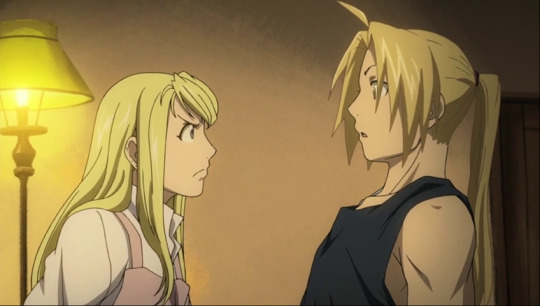
Winry Rockbell and Edward Elric in FMA:B. Slow burn, mutual pining, mutual cluelessness, what’s not to love? So soft and tender and funny all at the same time, and the mad respect Ed has for Winry is absolutely delightful. She does her own thing, and he’s totally supportive, just as she is of him. And a happily ever after??? UGH, I can’t, it’s perfect. The most straightforward and least convoluted of my whole list, and it’s comparatively easy to breeze through. FMA:B is great anyhow, so do yourself a favor and go watch it.
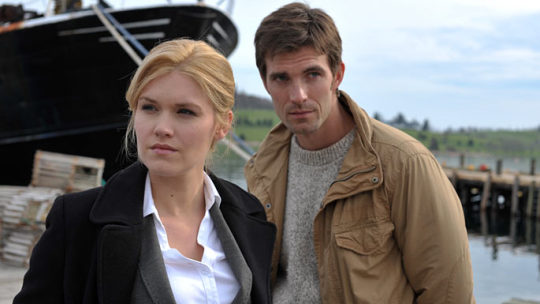
Audrey Parker/ Nathan Wuornos in Haven (with major caveats). Caveats first: they went overboard with the sexy stuff in my opinion. It got too smutty for me, but my tolerance for that stuff is super low, and it did still air on TV, so evidently it wasn’t as bad for the target audience as it was for my sex-in-media-repulsed self. I also find the final seasons to get a bit stale and repetitive in terms of them trying to advance the love story narrative (all the plot points for it got addressed in earlier episodes/seasons, so why are we going over it again??). They also have a bit of an issue in some episodes with dragging out conflicts because the characters just won’t talk to each other like adults. But overall, taken as a whole, it hits hard. Again, we have a slow burn, mutual pining dynamic that starts as a genuine platonic friendship, and transforms into a dimension and time defying chosen soulmates love story for the ages. The things they would do to save each other, even if it means they can never be together, just so they have the joy of knowing that their beloved is okay. The tiny ways they take care of each other- Audrey testing Nathan’s coffee to see if it’s too hot, Nathan slowing down so he doesn’t out-pace her, it’s just adorable.
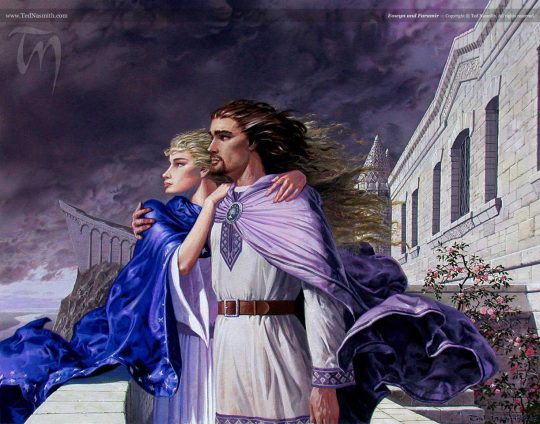
Faramir and Eowyn in The Lord of the Rings BOOKS. This is an interesting one because it happens really quickly and between two minor characters. But Tolkien did this really interesting thing where he established these two characters separately, and then brought them together and played off what we knew about each of them in context of everything else that had happened with the main story, and suddenly it has, as one of my professors would say, “the illusion of depth.” Faramir absolutely falls head over heels for Eowyn but won’t act until she can deal with her own crap and be emotionally available. Eowyn realizes that she was hung up on ideals, illusions, and false dichotomies. Faramir has been through a lot and is looking for peace. Eowyn is looking for who she really is when she realizes she has more than two choices in life. They find healing together, and in the process, find what they were looking for in each other. And all that happens in the space of, like, 4 pages. I LOVE IT.
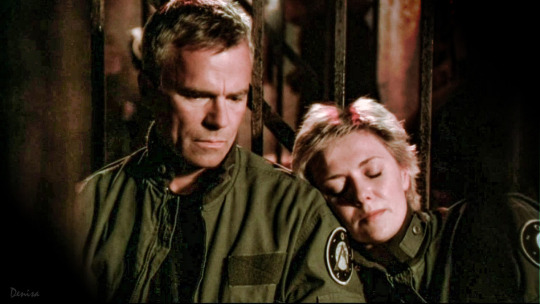
Sam Carter and Jack O’Neill in Stargate SG1. This one will hurt you to no end. You will hate life. But gosh dang if they aren’t perfect. This is the slowest burn and most mutual pining of all slow burn mutual pining ships to ever grace media. I’m talking 8 seasons of these two sharing feelings but being unable to express it for one reason or another. What are those reasons, you ask? Jack is her superior and respects her too much to put her in that position. No fraternization on the team. Sam has career aspirations, he won’t ruin her life. He’s got his own issues to work through and knows he isn’t emotionally available. Sam is clueless for a while, then when she realizes she has feelings for him but it couldn’t be because of their work dynamic and because he’s still dealing with his own crap, she tries to move on but keeps coming back to the unspoken fact that she still loves him. To the point that she breaks off her own engagement to a great guy because she realizes she was only trying to move on-- and wasn’t successful. They are clearly in deep for each other, and yet they keep making excuses why they can’t say it.
In the whole series, they never officially get together, and I HATE THAT. There are multiple alternate realities and timelines where they are together, and happy, but in the main timeline, they can’t get over themselves, and it hurts so bad because they’re so perfect. Jack knows she’s the smartest person in the room, and he supports her and defends her and listens to and defers to her. He respects her first as an expert, then as a colleague, and then as a woman whom he deeply loves even though he can’t find it in him to love himself. She appreciates his experience and leadership, and trusts him implicitly. She knows she’s got more book smarts, but relies on his judgement and ability to remain calm under pressure. She also knows she can be real with him, and he knows that when she calls him on his BS he better listen. She is his conscience, and he is her backbone. And in between episodes where they’re clearly pining for each other, and even during, they’re really great friends and a great team. I could seriously write an essay on why this ship is both perfect and intensely frustrating, but then again, you could just watch a great and classic series and see what I mean for yourself. (Then you’d also get to meet the perfection that is Teal’c, and watch Daniel Jackson’s transition from Milo Thatch in Space to sassy beefcake demigod who still loves archaeology.)
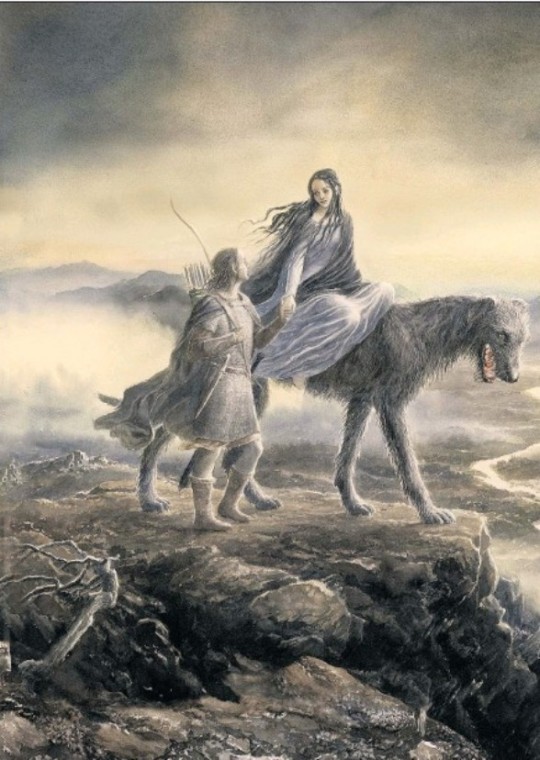
Beren and Luthien, Tolkien part 2, electric boogaloo. A love so powerful it transcends death, fate, hell and heaven all at once. It’s kind of wild and not what you’d expect if you’ve only read LotR (or only seen the movies), because it’s more a classic fairy tale than anything, but hot dang if it isn’t still one of the most powerful, moving, deeply impactful love stories in all of writing. It’s even a “love at first sight” narrative and I STILL fall hard for it. This story legit moves me to tears every dang time I read it, or even think about it too hard.
It starts as a simple “forbidden love” story, but these two loved each other so much that they defied one of the most powerful kings in all the world at that time (who was also Luthien’s dad, oopsies), defied Satan himself and marched into Hell just for the chance to be together, and then changed the very way the world works forever just so they could stay together and not be parted. Luthien is a total BEAST, while never giving up her gentle, loving, and tender nature. For the love of this man, she defies her father’s wishes and breaks herself out of her own dang tower to go rescue her prince instead of the other way round, she sends Sauron (yeah, he’s here too!) scurrying with his tail between his legs, wrecks his house, and frees all his slaves and prisoners just to try and get to Beren, drags his butt out of heck part 1, then willingly walks into literal, actual Hell with him and proceeds to enchant Satan and all the demons within. Then she gets her bf outta there after he loses his hand, and goes back to face her father unafraid. Basically, Beren undertakes a literally impossible task just for the chance to be with Luthien, but Luthien is the one that makes it happen because she loves him too much to sit around knowing he’s going to die. She’s willing to die with him rather than live without him, but more willing to dare death to come at her and get some because ain’t no way she’s losing him.
Then, at the last, when all should have been their happily ever after, everything goes wrong and she loses her beloved, and instead of mourning forever, she yeets off her mortal coil out of pure “Oh no you didn’t, not after all we went through” just to go stand before the God of Fate and the Dead and plead with him to change the rules of the universe itself just so that she can be with Beren. And he does it, because their love is so strong. Just for them, all of existence is rewritten so that they might never be parted.
And if you don’t think that’s the most beautiful thing you’ve ever heard, consider also: these two crazy kids were so wonderful that the Goodest Boy in all the world, a functionally immortal and super-intelligent dog sent from heaven itself by a literal god, willingly turned on all his masters and spontaneously learned intelligent speech just so he could help them out and be their Good Boy til the bitter end, thus (in Tolkien’s mythos) starting the whole “man’s best friend” thing with dogs. So yeah. And, uh, Tolkien based it on him and his wife, to the point of ripping their first meeting frame-for-frame from real life. It’s too much y’all.
Anyhow, this post is way, way too long, but I was just feeling the need to get that out there. Maybe I’ll have more in the future, but for now, this is what was on my mind. Particularly the last two.
46 notes
·
View notes
Text
Science, Religion, and Spirituality: In Search of God
Dr. Sukhraj S. Dhillon Mountain House, CA 95391, USA
Science and religion have traditionally been treated like oil and water--they don’t mix. They don’t mix because we have been led to believe that religion is a form of subjective fundamental belief whereas science is objective verifiable phenomenon. In this article, I have developed a formula to mix science and religion and to explain that the concept of God has practical value only if we accept it as part of us. A scientist may find difficult to believe that some wise old man or woman sitting up in heaven is keeping track of everything, but can’t deny the incredible awareness and intelligence that exists in life, in nature, and in us. It’s being a scientist that makes us spiritual.
The questions about God, hell, heaven, and rebirth, and their relationship to realization, enlightenment, and spirituality, have occupied our mind for centuries in one form or another: What is God? Does He/She really exist? Why do we search for God? Do religions really believe in the same God? Why are there religious wars? Is there really a place such as heaven or hell? What was our past life? What will be our future life? Is there really such a thing as past life or future life?
Religions and prophets have been preaching about God, hell, and heaven for centuries, and millions of people have cultivated belief in these phenomena. The revolution of science and technology in this century has forced many of us to reevaluate the doctrines and tenets of our faith. Should we believe in creation or should we believe in evolution? Should we believe in heaven and God's court of justice when we look up in the sky, or should we believe in the space, the planets, and the galaxies up there? I hope this article provides a fresh insight into the mysteries about God, hell, heaven, and rebirth--and leave us wiser, peaceful, and enlightened.
What is God?
The philosophy of religion or the institute of God is the human's greatest discovery. God is not a physical object. It is a state of mind. God is the Electromagnetic pulse of energy that gives life and lives within all. What we call our conscious/soul is part of God within us. That is why great prophets and religious scriptures say God is everywhere (omnipresent). Whenever, wherever, our mind and soul is with us, God is there; and the saying goes “God resides in our hearts- -not in temples, mosques, or churches. Bernie Siegel (author of Love, Medicine & Miracles) says same thing, “God resides in each of us.” In other words, God is a spirit that exists in every person. The rich, the poor, the king, the subject, the religious, the atheist, the sinner, the sage, the Easterner, the Westerner, the Christian, the Jew, the Hindu, the Muslim, the Sikh, the Buddhist, and on and on.... This is consistent with what the Christians preach: “We are ideas of God!” And ideas come from--the divine mind. Only people (Homo sapiens) among the animal species are fortunate enough to have a powerful mind and experience the presence of spirit in their mind. The recognition of that spirit is what gives us spiritual living or realization of God. Completely illuminated human beings know that God is present in the deepest and most central part of their own soul. God is not outside the world. God is the world. So, philosophically, God is a State of Mind; OR It’s our mind, which is God! OR God is a spirit/conscious energy that exists in each one of us! (lf you're confused, don’t worry! Read on!!)
“God is not outside the world. God is within us. Live a Holy, Healthy, Happy Life.”
Religion-spirituality and science can come together. God is scientific. God is light. God is darkness. God is intelligent, loving energy. God is nature. God is in us. God is psychoneuroimmunology when we witness miracles of healing. God is all. Some of us may distinguish between religion and spirituality; religion may be a possessive and destructive force that doesn’t allow expansion of mind, whereas spirituality is a healing force with no rules attached to God’s love or God’s ability to sustain us. We should remember the real purpose of a religion is spirituality; and we should try to stay away from names and definitions. God, for example, is one of the many names of the same divine force or universal energy.
For those who feel comfortable with the word God or Creator, it’s a divine word! It brings peace of mind. With prayer, we speak to God. With miracles, God responds. Science now explains miracles of healing through the mind-body relationship. With prayer we awaken the spirit in our mind, and the transformed-spiritual mind causes hormonal and other chemical changes that eventually may result in healing. As such, God or Creator is not a separate entity, it’s part of us- -present right in our mind all the time. God is within us every moment, in every circumstance. He/She is to our left and to our right, before us and behind us, above us and beneath us. God watches every act--criminal or noble--and every moment, whether we’re alone or in a crowd. We cannot deceive God (our own mind/conscious) by thinking nobody is watching us.
What about our belief in God's form of existence or court of justice? Nobody could describe the physical or descriptive existence of God in the past, nobody can describe it now in the present, and nobody is likely to describe it in the future. For an atheist there is no God because physical existence cannot be proven. And that is why discussion on existence or nonexistence of God never gets anywhere. God's existence cannot be proved or disproved. God is not a body like us sitting somewhere in the sky. We have launched rockets into the space, we have built space-station, we have analyzed moon rocks, we have taken close-up pictures of the planets--we don’t find even primitive life form, never mind finding God in the sky. Science may not find God in the sky who keeps track of everything, but the incredible awareness and intelligence that exists in life, in nature, and in us on this Earth is a form of God's scientific existence.
It’s impossible to see God, because He/She is an integral part of our mind. Since God is within us, we obviously can’t see God, just as, for instance, an eye cannot see itself and an ear cannot hear itself. And Zenrin puts in simply, “Like a sword that cuts, but cannot cut itself; like an eye that sees, but cannot see itself.” Our soul and God are one. The individual soul (atma) is part of universal or original or supreme or perfect soul called Parmatma (name of God in eastern scriptures). The attempt to bring the soul and God together merely perpetuates the illusion that the two are separate. It’s not so, and we’re already It. To know God is to be God; the two are not at all separate, points out the Hindu scripture Upanishad. If God and we were two separate entities, then we could see, hold, and go around Him/Her in a ceremonial worship! However, in various religions we find unique ways to worship God. Practitioners use symbols of godhead varying from images/statues to holy books and even imaginary pictures.
The great prophets, Christ, Mohammed, Nanak, Buddha, Krishna, and Mahavir, all provided avenues to the realization of God or to awaken the spirit that exists in our minds. These paths are different, but the destination or message is similar. More importantly, there is one common element; they all focus on something that exists in our minds and strive for a realization or spiritual awakening that forms the basis for a changed or spiritual state of mind.
If God is a state of mind with awakened spirit, what is that state of mind!
That state of mind is without fear, without enmity, immortal without the fear of death or birth, complete within itself--timeless, ageless, and form- less (Akaal Moorat). We know that only the physical body ages, spirit is not affected by time or age or birth or death. A few blessed ones realize that state of mind (Nirbhau, Nirvair, Akaal Moorat, Ajooni, Saebhang, Gur Parsad Mul-Mantra or Basic Principle, Japuji). Nanak, Mohammad, Christ, Buddha, Mahavir, and other great prophets attained such a state of mind. They were able to awaken the spirit that existed in their minds. They realized the presence of spirit (God). In other words, they found God.
It is that state of mind with awakened spirit which Rajnish called orgasmic, saints call peaceful, psychiatrists call tranquil, and drug addicts call getting high.
Many spiritual masters have called this enlightened state of mind by different names. Buddha called it “the enlightened one.” Christ and Messiah also meant the same. St. Paul called it “the peace of God that passeth understanding” and Richard Maurice Bucke named it "Cosmic Consciousness.” Guru Nanak described as “realization of ultimate truth.” In Zen it is satori, in yoga it is samadhi or moksha, in Sufism it is fana, in Taoism it is wu or the Ultimate Tao. Gurdjieff labeled it “objective consciousness”; Sri Aurobindo refers to it as “illumination,” “liberation,” and “self-realization.” Dante said, “trans-humanization into a God.” Likewise, enlightenment has been symbolized by many images; the thousand-petaled lotus of Hinduism, the Holy Grail of Christianity, the clear mirror of Buddhism, Judaism’s Star of David, the yin-yang circle of Taoism, the mountain top, the swan, the still lake, the mystic rose, and the eternal flame.
How an individual describes the enlightened state of mind may seem quite different and even opposed. As one and the same pain may be described either as a hot pang or a cold sting, so the descriptions of the enlightened experience may take forms that seem so different. One person may say that he/she has found the answer to the whole mystery of life, but somehow cannot put it into words. Others will feel that they have experienced, not a transcendent God, but their own inmost nature. Some will get the sense that their egos or selves have expanded to become the entire universe, whereas others will feel that they have lost themselves altogether and that what they called their egos were never anything but abstractions. Some will describe themselves as infinitely enriched, while others will say they haven't a care in the world. A theist may call it a glimpse of the presence of God.
Irrespective of that experience, we can call this state of mind with awakened spirit “the spiritual state of mind.” In everyday living, spiritualism is experienced as kindness, forgiving, mercy, compassion, peace, joy, acceptance, non-judgment, joining, intimacy, and an absence of need to dominate others. Spiritual beings focus on authentic personal empowerment, utilize multidimensional thinking, and believe loving guidance is available. They feel connected to all of humanity and practice a life without desire to control someone or to prove that they are right and the other person is wrong. They know a dimension beyond cause and effect. They are motivated by morality, serenity, and quality of life. They recognize a violent response to evil as participating in evil and focus on what they stand for. They feel a sense of responsibility and belonging to the universe. They have a tendency to extend love and help others rather than feel enmity and competition. Their minds are not controlled by anger, fear, lust, greed, attachment, false ego, or envy. Their existence is not affected by time and age. They are not afraid of getting old or of dying young. They see no sin in the world to escape from.
Nonspiritual people, on the other hand, are in a state of fear and experience anger, abuse, pain, greed, addiction, selfishness, obsession, corruption, and violence. They hold grudges and seek revenge for perceived wrongdoing. They are only motivated by achievement, performance and acquisitions. They feel separate from all others.
Why is there a spiritual need to search for God?
“Possession of material riches, without inner peace, is like dying of thirst while bathing in a lake.” --Paramhansa Yogananda
To satisfy the sense may be the major challenge for some of us, but it is actually the easiest part. The mind and spirit require continual attention and stimulation. It is not until we assume responsibility for the enhancement of the total self that we can live full lives.
For the sake of simplicity, let's divide human life into three levels of existence. All three levels, we may point out, are a normal part of the human life cycle. It’s how we handle these levels that create hell or heaven in our lives.
1. The first level of our existence as a highly evolved animal leads us to search for sensual pleasures such as lust, drinking, smoking, drugs and anything that satisfies or pleases the senses. Many people may spend their entire life right at this level.
2. The second level of our existence as we advance leads us to think more like humans since we live as a civilized society. That is to have a well-paying and respectable job, a good house, an expensive car, and other materialistic desires. All this is a normal character of ego which requires strength, strategy, and effort to achieve material possessions. Most of us spend our life rising only to second level.
3. The third or highest level of our existence demands something more than the first level of sensual pleasures and the second level of materialistic living. It provides an extra touch to the first and second levels! That third level is spiritual living or enlightenment, which we can call the ultimate achievement in human existence. It is because of this desire that we find well educated, highly intelligent, extremely successful, wealthy people looking for a spiritual leader or guru. These are the people who desperately follow those who can provide some insight into spiritual philosophy, whether it is Maharishi Mahesh Yogi or Bhagwan Rajnish or Swami Prabhupada--author of English version of Bhagvad Geeta and founder of International Society of Krishna Consciousness in the western world, which provided the seed of Hare Krishna movement.
Most often the spiritual gurus are from the east since the western society is very big on action and there is no guidance for spiritual advancement. Owing to this spiritual need or void, 2500 or more cults exist in the U.S. alone. Cult leaders come from both east and west. Cult leader Jim Jones poisoned hundreds of his followers in the 1980s and David Koresh lead 86 people to burn themselves to death at Waco, Texas in 1993. Luc Jouret led over 50 members to forced death in Canada and Switzerland in October 1994. In March 1997, 39 followers of Heaven's Gate died in a mass suicide in Rancho Santa Fe, California near San Diego. It’s the understanding of spirit in our own mind that can save us from cult incidences.
“To seek spiritual power, there is no need to seek it through any occult hierarchy, any guru, any doctrine,” says J. Krishnamurti. “The important thing is to free our mind of envy, hate, and violence; and for that we don’t need an organization.” He calls people to examine their own hearts and minds to see the egotism and self-ignorance at the root of all sufferings and troubles; that is precisely what prevents enlightenment and spiritual power.
The spiritual power doesn’t come from the same sources that feed our ego. Ego power is an important part of society in the worldly sense. It requires strength, strategy, and efforts to achieve things that have a social value. We like a well-paying respectable job regardless of whether we're good at it, and it’s because of ego power we often are attracted to other material possessions.
Our efforts to achieve ego power, however, don’t necessarily empower the spirit or soul. The spiritual power comes from living close to the heart. It comes from unexpected sources such as failure, sickness, and loss. For example, when we endure through loss of job or illness, we find inner strength that strengthens our spirit. Spiritual or soul power also comes from being ourselves doing what we’re good at. Inherent qualities such as intelligence, attractive appearance, and even powerful voice provide soul power. Spiritual power comes from doing something for community or country. Although we may not see a benefit in the worldly sense, it nurtures the spirit and feeds the soul. When we fail to nurture our soul, we fail to live in peace with ourselves in the face of illness, loss of job or loss of loved one. It was perhaps the spiritual power, more than her wealth or recognition that provided Mrs. Jacqueline Kennedy Onassis the strength to live through life-crises up to the last minute of her life-- May 19, 1994. It is for those successful, intelligent people who are looking for a spiritual power this article, I hope, will play a significant role. And please remember, a life lived in a spiritual state of mind or enlightenment is an everyday life with an extra dimension.
How about hell, heaven, and rebirth?
It’s our mind that creates hell. It’s our mind that creates heaven. And it’s the liberation of our mind (or soul/conscious which is part of God in us) from the fear of death or other miseries of the world that is liberation from birth and death cycle. Buddhism calls it Nirvana.
Does hell or heaven exist as a particular place? No one has seen! But a person is in heaven if he/she is in spiritual state of mind; and is in hell if he/she loses control of mind. And our personality is the reflection of our state of mind. If our state of mind is saintly, we are a saint; if our state of mind is love, we are lovable; if our state of mind is complete, we are complete; if our state of mind is intelligent, we are intelligent; if our state of mind is unlimited, we are unlimited; if our state of mind is hope, we are hopeful; if our state of mind is honest, we are honest. On the other hand, if our state of mind is devilish, we’re devils; if our state of mind is evil, we become evil person. When, for example, we lose our control of mind to drugs--we’re opening the door to hell.
Satan or evil is nothing but a counterpart of goodness. We know heat exists, but its counterpart cold doesn’t exist. Cold is merely the deficiency or lack of heat. Similarly, light exists, but its counterpart darkness doesn’t exist. Darkness is merely the deficiency or absence of light. Same is true for evil. Evil doesn’t exist, but its counterpart goodness exists. It is simply the deficiency or absence of goodness that we have named evil. And evil is what leads us to the door of hell. Evil mind is the mind out of control. It’s like the fire, which is our servant for cooking and keeps us warm, but becomes evil when it gets out of control.
Conclusion
All the thoughts here are part of a single concept. By improved state of mind or spiritual state of mind or sharpening our faith, we can add an extra dimension to everyday life. This concept ignores neither science nor religion, and removes the cloudiness of fear and confusion that interferes with achievement of ultimate happiness. Those who are in the business of saving souls after death should focus on the soul when they are still living on this planet.
This article is Yale-educated Dr. Dhillon’s personal conviction that has two pillars: an advanced degree in life sciences, molecular biology and evolution from the west and a fascination with spirituality from the east crafted out of studies at Yale University, U.S.A. in the west and Punjab University, India in the east. His views are expressed in over 12 books in self-help and spiritual series, several research articles, on television, in newspapers, and workshops.
References: "Science, Religion & Spirituality," "In Search of God," and "Soul and Reincarnation" available at various Book Sellers including Amazon and Barnes & Noble. http://drdhillon.blogspot.com/
2 notes
·
View notes
Text
entry #3
Jordon Peterson just encouraged me to write more, so here we are again. Sat on my bed with my little laptop, letting the streams of consciousness manifest into the tippy tapping of the keyboard, a noise I really like. I normally can’t stand little noises like that. Clocks ticking for example, drives me crazy. The beeping of a low battery fire alarm is even worse. Fascinating, I know.
The concept of family has been knocking around my head lately, I always find it strangely coincidental when the themes within my own mind are outwardly validated by what is going on externally around me. When I’m thinking about something and then the subject happens to present itself to me in some form, through a TV show or a film or a podcast or a real-life event. I went with my grandad to visit his daughter (my auntie), and her two teenage sons to have a Sunday Roast together today. It was good to see them because my family has always been small and fragmented. It feels positively ritualistic for us to gather together like that even briefly. Then later on in the night a podcast pops up in my YouTube subscriptions of Jordan Peterson and his daughter talking with Russell Brand about family. Also, coincidentally, Brand and Peterson have written the books that I’m currently reading. Both of them are great men. Brand was an inspiration for me due to his journey from addiction to recovery. He actually first got clean in my hometown of Bury Saint Edmunds by the same organisation that my mum and nan worked with to kick heroin. Another strange coincidence. Or maybe it really is just a small world with a very few central themes that transcend through time and space for humanity, hence I see them everywhere. The very heavy, important themes that surround the meaning of existence: Love, life, death, sacrifice, devotion, duality, surrender, forgiveness, hatred, progression, conflict, values, ethics, symbolism, truth, illusion, punishment, good and evil. All sounds very religious actually. Which isn’t much of a surprise if the purpose of religion is to reconcile with these themes which we all deal with in life. Religion never clicked with me; it still doesn’t. I consider myself an extreme atheist and sceptic, to the point where I jive heavily with the vibes of LaVeyan Satanism. I read the satanic bible when I was about 14, but I can’t recollect if it was before or after my mum died. I just remember how it was the first book that truly resonated with me and gave me the courage to stand up for myself in the face of tyranny, which at that time were bullies at school, some of those bullies were teachers. This is a little post I recently submitted to the r/satanism, the online Satanist forum on Reddit:
‘Growing up in the Christian country of England, we had to sing hymns and take part in attempted brainwashing in our public schools from an early age. Not only that but teachers usually had 'good vs evil' (authority = good) philosophy that this culture has instilled into us that really is not that helpful on its own. I was SO frustrated with the whole system and the people in it. There were some bullies too, and I was always told to 'be the bigger man' by never retaliating. I was about ready to do something extreme to get myself expelled. Then I got hold of this book when I was about 14, read it all in one sitting, and it was so comforting to me to read Anton spin everything I had known on its head, and he was the first person who ever told me to smite those who have infringed upon me, not turn the other cheek. And it worked. I never took shit lying down from bullies or teachers after processing the book mentally. After that, when they dished it to me, I threw it back at them, and many times I would win. I won by getting through school and passing my exams despite hating the environment I was in.’
I don’t really want to read the book again, because I may have outgrown the deliberate edgy nature of it, and I have so many new books to read, but I will always keep it close to me as a symbol and reminder of what I took from it. It was a really important step for me towards self-love and self-respect, as well as being able to discriminate between the people that deserve my love and those who deserve my wrath, or even better, those I should take no consideration for at all. If I have to sum it up, the philosophy of satanism encourages you to challenge God’s authority, not just submit to it because ‘that’s just the way it is and has always been.’ Through doing that, we become our own gods, which is a far more appealing position to be in than the sinner damned to suffer for eternity, for me anyway. Satan himself is the good guy in the story if you really think about it. The advances we have made culturally, legally and socially are mostly thanks to those brave enough to challenge the status que and authority. The first couple waves of feminism, LGBT rights, protection of the sanctity of childhood, better care for the sick and disabled are a few crucial movements. And without discrediting the brave soldiers who fought in the world wars, because what they went through really was hell on earth, the Armageddon, it’s an example of what happens when people are encouraged to follow their false gods. It is still mind boggling to me how the world nearly ended in all out nuclear warfare only recently. Well, I say ended, but we’ve all seen Jurassic Park… ‘Life finds a way.’ That dark fetishization of destruction within me I have mentioned before still sort of wants that to happen. Or even better, the whole planet being obliterated into pieces by something hurtling through the abyss directly into us. Not just a small asteroid that disrupts the atmosphere like the one that killed the dinosaurs off, I mean something BIG that gives life no chance of recovery. Perhaps the reason for this ultra-mega-death wish is because the alternative is so cruel and unappealing. The sun will burn out and everything will slowly wilt away. I just want us to go out with a bang, you know? Again, it is just me trying to control fate and death. I’m sure any astrophysicist would be able to ruin my Earth killing fantasy by informing me that it’s not even possible because of gravity and all that other magical shit that’s beyond me. That’s if I ever bad the balls to even talk about these terrible things out loud.
1 note
·
View note
Link
I don't know what to do with good white people.
I've been surrounded by good white people my whole life. Good white people living in my neighborhood, who returned our dog when he got loose; good white teachers in elementary school who pushed books into my hands; good white professors at Stanford, a Bay Area bastion of goodwhiteness, who recommended me M.F.A. programs where I met good white writers, liberal enough for a Portlandia sketch.
I should be grateful for this. Who, in generations of my family, has ever been surrounded by so many good white people? My mother was born to sharecroppers in Louisiana; she used to measure her feet with a piece of string because they could not try on shoes in the store. She tells me of a white policeman who humiliated her mother by forcing her to empty her purse on the store counter just so he could watch her few coins spiral out.
Two summers ago, my mother showed me the welfare reports written about her family. The welfare officer, a white woman, observed my family with a careful, anthropological eye. She described the children, including my mother, as "nice and clean." She asked personal questions (did my grandmother have a boyfriend?) and wrote her findings in a detached tone. She wondered why my grandmother, an illiterate Black mother of nine living in the Jim Crow South, struggled to find a steady job. Maybe, she wrote in her loopy scrawl, my grandmother wasn't searching hard enough.
This faded report is the type of official document a historian might consult if he were re-constructing the story of my family. The author, this white welfare officer, writes as if she is an objective observer, but she tells a well-worn story of Black women who refuse to work and instead depend on welfare. Occasionally, her clinical tone breaks down. Once, she notes that my mother is pretty. She probably considered herself a good white person.
In the wake of the Darren Wilson non-indictment, I've only deleted one racist Facebook friend. This friend, as barely a friend as a high school classmate can be, re-posted a rant calling rioters niggers. (She was not a good white person.) Most of my white friends have responded to recent events with empathy or outrage. Some have joined protests. Others have posted Criming While White stories, a hashtag that has been criticized for detracting from Black voices. Look at me, the hashtag screams, I know that I am privileged. I am a good white person. Join me and remind others that you are a good white person too.
Over the past two weeks, I've seen good white people congratulate themselves for deleting racist friends or debating family members or performing small acts of kindness to Black people. Sometimes I think I'd prefer racist trolling to this grade of self-aggrandizement. A racist troll is easy to dismiss. He does not think decency is enough. Sometimes I think good white people expect to be rewarded for their decency. We are not like those other white people. See how enlightened and aware we are? See how we are good?
Over the past two weeks, I have fluctuated between anger and grief. I feel surrounded by Black death. What a privilege, to concern yourself with seeming good while the rest of us want to seem worthy of life.
When my father was a young man, he was arrested at gunpoint. He was a Deputy District Attorney at the time, driving home one night from bible study when LAPD pulled him over. A traffic violation, he'd thought, until officers swarmed his car with shotguns aimed at his head. The cops refused to look in his wallet at his badge. They cuffed him and threw him on the curb.
My father is mostly thankful that he'd stayed calm. In his shock, he had done nothing. That's what he believes saved his life.
I think about this while I watch Eric Garner die. For months, I avoided the video, until we arrived at another officer non-indictment. Now I've seen the video of Garner's death, as well as a second video I find even more disturbing. This second video, taken immediately after Garner has been killed by a banned chokehold, shows officers attempting to speak to him, asking him to respond to EMTs. They do not yet know that he is dead, and there's something about this moment, officers shuffling around as an EMT seeks a pulse, that is so bafflingly and frustratingly human, so different from the five officers lunging and wrangling Garner to the ground.
In the wake of this non-indictment, a surprising coalition of detractors has emerged. Not just black and brown students hitting the streets in protest but conservative stalwarts, like Bill O'Reilly or John Boehner, criticizing the lack of justice. Even George W. Bush weighed in, calling the grand jury's decision "sad." But even though many find Garner's death wrong, others refuse to believe that race played a role. His death was the result of overzealous policing, a series of bad individual choices. It would have happened to a white guy. The same way in Cleveland, a 12-year-old Black boy named Tamir Rice was killed by officers for playing with a toy gun. An unfortunate tragedy, but not racial. Any white kid playing with a realistic-looking toy gun would have been killed too.
Darren Wilson has been unrepentant about taking Mike Brown's life. He insists he could not have done anything differently. Daniel Pantaleo has offered condolences to the Garner family, admitting that he "feels very bad" about Garner's death.
"It is never my intention to harm anyone," he said.
I don't know which is worse, the unrepentant killer or the man who insists to the end that he meant well.
A year ago, outside the Orange County airport, a white woman cut in front of me at the luggage check. She had been standing next to me, and soon as the luggage handlers called next, she swooped up her things and went to the counter. She'd cut me because I was black. Or maybe because I was young. Maybe she was running late for her flight or maybe she was just rude. She would've cut me if I had been a white woman like her. She would've cut me if I had been anyone.
Of course, the woman ended up on my flight, and of course, she was seated right next to me. Before the flight took off, she turned to me and said, "I'm sorry if I cut you earlier. I didn't see you standing there."
I often hear good white people ask why people of color must make everything about race, as if we enjoy considering racism as a motivation. I wish I never had to cycle through these small interactions and wonder: Am I overthinking? Am I just being paranoid? It's exhausting.
"It was a lot simpler in the rural South," my mother tells me. "White people let you know right away where you stood."
The problem is that you can never know someone else's intentions. And sometimes I feel like I live in a world where I'm forced to parse through the intentions of people who have no interest in knowing mine. A grand jury believed that Darren Wilson was a good officer doing his job. This same grand jury believed than an eighteen-year-old kid in a monstrous rage charged into a hailstorm of bullets toward a cop's gun.
Wilson described Michael Brown as a black brute, a demon. No one questioned Michael Brown's intentions. A stereotype does not have complex, individual motivations. A stereotype, treated as such, can be forced into whatever action we expect.
I spent a four hour flight trying not to wonder about the white woman's intentions. But why would she think about mine? She didn't even see me.
In elementary school, my older sister came home one day crying. She had learned about the Ku Klux Klan in class that day and she was afraid that men in white hoods would attack us. My father told her there was nothing to worry about.
"If a Klansman sat at this table right now," he said, "I'd laugh right in his face."
My mother tells stories of Klansmen riding at night, of how her grandmother worried when the doctor's son—a white boy—visited her youngest sister because she feared the Klan would burn down their home. When I was a child, I only saw the Klan in made-for-TV civil rights movies or on theatrical episodes of Jerry Springer. My parents knew what we would later learn, that in the nineties, in our California home, surrounded by good white people, we had more to fear than racism that announces itself.
We all want to believe in progress, in history that marches forward in a neat line, in transcended differences and growing acceptance, in how good the good white people have become. So we expect racism to appear, cartoonishly evil like a Disney villain. As if a racist cop is one who wakes in the morning, twirling his mustache and rubbing his hands together as he plots how to destroy black lives.
I don't think Darren Wilson or Daniel Pantaleo set out to kill Black men. I'm sure the cops who arrested my father meant well. But what good are your good intentions if they kill us?
When my friends and I discuss people we dislike, we often end our conversations with, "But he means well."
We always land here, because we want to affirm ourselves as fair, non-judgmental people who examine a person not only by what he does but also by what he intends to. After all, aren't all of us standing in the gap between who we are and who we try to be? Isn't it human to allow those we dislike—even those who harm us—a residence in this space as well?
"You know what? He means well," we say. We lean on this, and the phrase is so condescending, so cloyingly sweet, so hollow, that I'd almost rather anyone say anything else about me than how awful I am despite how good I intend to be.
I think about this during a car ride last weekend with my dad, where he tells me what happened once the cops finally realized they had arrested the wrong man. They picked him up from the curb, brushed him off.
"Sorry, buddy," an officer said, unlocking his handcuffs.
They'd made an honest mistake. He'd fit the description. Well, of course he did. The description is always the same. The police escorted my father onto the road. My father, not yet my father, drove all the way home without remembering to turn his headlights on.
Brit Bennett recently earned her M.F.A. in creative writing at the the Helen Zell Writers' Program at the University of Michigan. She is currently a Zell Postgraduate Fellow, where she is working on her first novel.
2 notes
·
View notes
Text
The Invisible Church
It had been about 100 years since anyone last saw her. Rumors about an unlikely find of Marco Polo's remains in her depths, and the supposed beauty of an unseen altar announced her delayed return. I don't remember her façade —even when she stood at the front of San Lorenzo square, I couldn't describe it— now completely covered with colorful banners, announcing the opera of the composer Luigi Nono. [1]
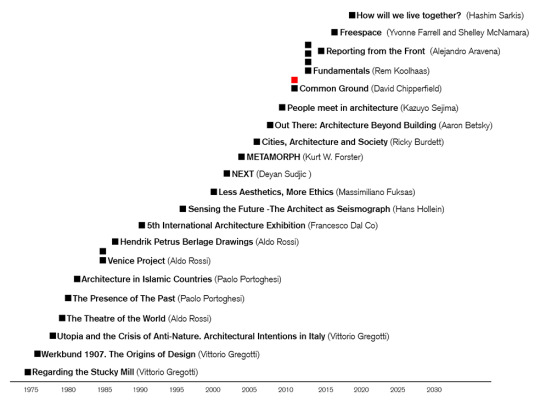
Read also “Teatro del Mondo: An Odyssey”, “Emblem Of A Better Germany?”, “The Greek Experiment” and “The Introverted Seismograph”
The structure designed by Renzo Piano on that evening occupied it all; a maze of scaffolding, where to navigate it was to play a role in it, and a brief description of the "huge musical instrument and sounding board that housed the stage, audience and orchestra" [2] to be seen from the seats at the center of that all-encompassing stage.

Music Space for Prometeo Opera by Renzo Piano Architects (1984), San Lorenzo Church, Venice, Italy | Fondazione Renzo Piano

Music Space for Prometeo Opera Section Drawing by Renzo Piano Architects (1984), San Lorenzo Church, Venice, Italy | Fondazione Renzo Piano
Everything was ruddy, shadowy, and indistinct. Even more so when they had just lit up the stage and my eyes were dazzled, and I was barely able to see that enormous door wide open, through the vast and incredible hole that swallowed the whole of the lower portion of the altarpiece.
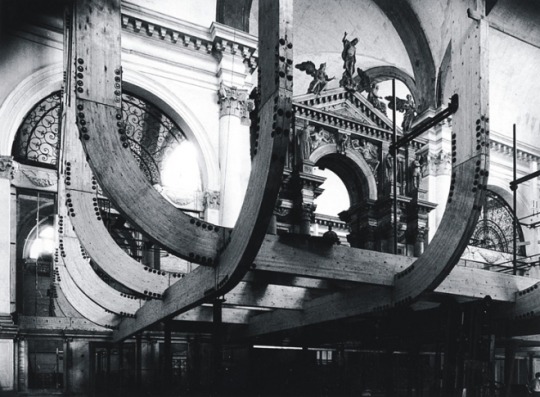
Music Space for Prometeo Opera by Renzo Piano Architects (1984), San Lorenzo Church, Venice, Italy | Fondazione Renzo Piano
The musicians positioned themselves along the staircase, the lights dimmed and Prometheus began to fill the room with its flame, in a musical conversation between the wooden panels, the omnipresent scaffold and the hidden walls of the church.

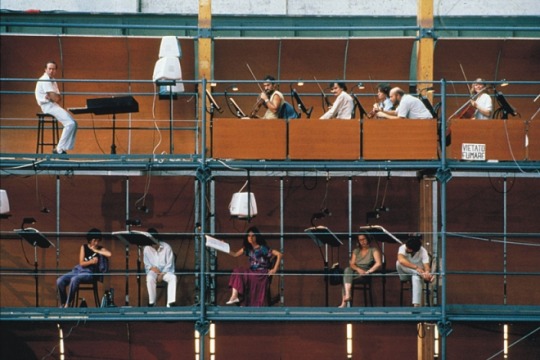

Prometeo Opera Musicians Rehearsal (1984) in San Lorenzo Church, Venice, Italy | Fondazione Renzo Piano
I like to believe the music made her visible for a moment and I was able to see her face —even if covered— for the night.
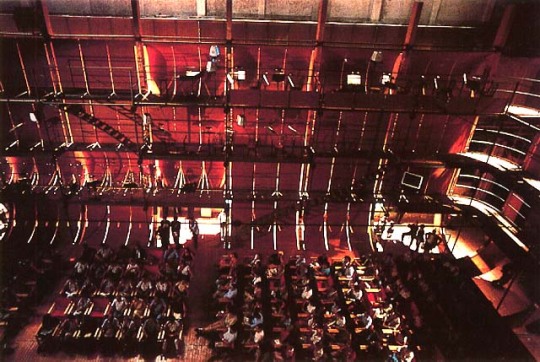
Prometeo Opera Opening Night (1984), San Lorenzo Church, Venice, Italy | Fondazione Renzo Piano
Maybe it was just the illusion of wanting to see her real face. Maybe it was the face of Prometheus before the doors of light and thunder closed again. [3]
“Black here and white there-in patches. She’s a kind of half-breed, and the colors come off patchy in places instead of mixing. I’ve heard of such things before. And it’s the common way with these venues, as anyone can see.” [4] The reality is that the church was invisible. She had always been. [5] Piano and Nono's imagination created a place that fitted in with what they thought they knew about her glaring real absence. They dressed her in masks, clothes and artifices for her to become them in time. In this little church, form was background. What we witnessed there was not a mere representation of Prometheus; it was Prometheus. Beyond the brief moments that her stolen radiance lasted, she would stay only Prometheus. [6] For the more they included her in the conversation, the more invisible she was to all the present. The church was silent and nodding, and those were her best qualities; a magnificent vision of what real invisibility means —the mystery, the power, the freedom, the licentiousness— where they saw no inconvenience in disposing of the helpless building. They arrived at the conclusion that a destitute church could become the manifestation of anything.
Twenty-eight years elapsed since the Italian music and pyrotechnics, when the Mexicans arrived with their ideas for promoting folklore. [7]
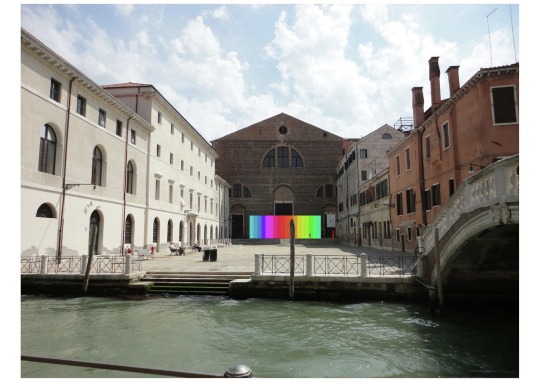
Culture Under Construction - The Collectivity of Cultural Space Installation Photo Montage 2012, San Lorenzo Church, Venice, Italy | Arquine
The same biennial, the same pretensions, the same assumptions, the same scaffold, that now covered her from the outside; new brighter and more colorful banners fluttered in the Venetian summer breeze laying over the church once more.

Culture Under Construction - The Collectivity of Cultural Space Mexican Pavilion at the Venice Architecture Biennale 2012, San Lorenzo Church, Venice | Arquine

Culture Under Construction - The Collectivity of Cultural Space Mexican Pavilion at the Venice Architecture Biennale 2012, San Lorenzo Church, Venice | Archdaily

Culture Under Construction - The Collectivity of Cultural Space Mexican Pavilion at the Venice Architecture Biennale 2012, San Lorenzo Church, Venice | Biennale di Venezia
The gesture stood as a true triumph of artifice over reality, choosing the most crowded moments of its square to show the cultural power of a distant country, which found itself eagerly seeking to show its appreciation for the ruin, preservation and millennial constructive capacities. They decided to elevate the scaffold and extended it to the façade —as the Italians had done in their time to her interior— covering the church’s entrance in its entirety with a pompous mask.
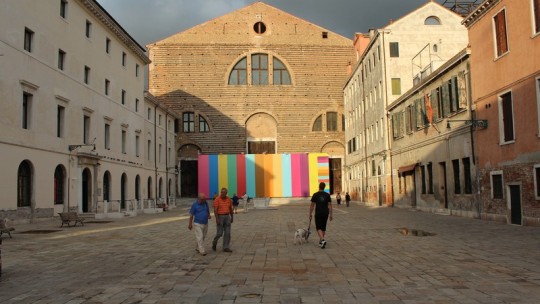
Culture Under Construction - The Collectivity of Cultural Space Mexican Pavilion at the Venice Architecture Biennale 2012 Front Facade 2012, San Lorenzo Church, Venice, Italy | Arquine
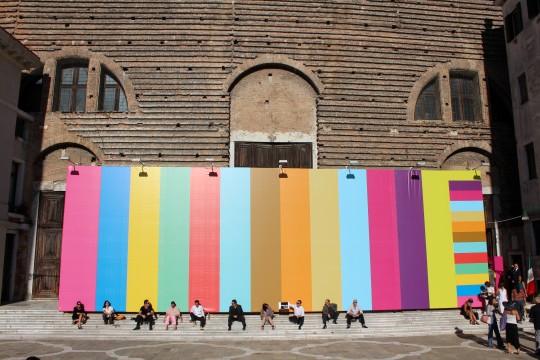
Culture Under Construction - The Collectivity of Cultural Space Mexican Pavilion at the Venice Architecture Biennale 2012 Front Facade 2012, San Lorenzo Church, Venice, Italy | Biennale di Venezia
With some ingenuity, imagination, but above all money, she assured them a visible place at the Biennale [8] at the cost of her own. But pacts are easy to break, especially if they are written on air and promised from afar [9]. They would soon realize the terrible contradiction: after the frantic gestures to recover the church by Mexico —which surprised more than one— the headlong pace after the summer that swept her away, the inhuman bludgeoning of all the tentative advances of curiosity, the taste for winter that led to the closing of doors, the pulling down of blinds, the extinction of candles and lamps after the party [10], the church was still empty.


San Lorenzo Church Interior 2012, San Lorenzo Church, Venice, Italy | Arquine
She disappeared for a while, but with the return of the Biennale-eaggered tourists that the summer brings, so did the scaffolding, this time to cover the wounds underneath Ariel Gusizk's Cordiox [11].

Cordiox Mexican Pavilion at the Venice Art Biennale 2013 Installation 2013, San Lorenzo Church, Venice, Italy | Arquine
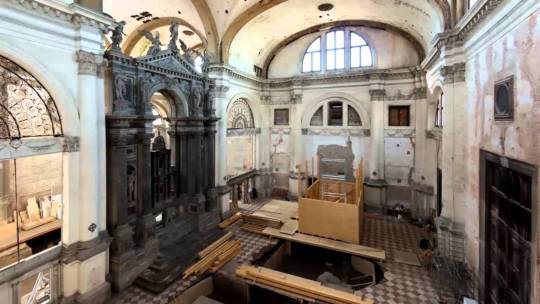
Still from Video Cordiox Mexican Pavilion at the Venice Art Biennale 2013 Installation in progress 2013, San Lorenzo Church, Venice, Italy | Marco Mosco

Cordiox Mexican Pavilion at the Venice Art Biennale 2013 Installation in progress 2013, San Lorenzo Church, Venice, Italy | Arquine
The inner emptiness was of absolute clarity; her invisibility transcended the concealment of her ordinary face. The Church for the first time was half-bare, and yet, the only thing we could —we wanted— see were her improvised clothes. Those scaffolds that had already become the building; whether to cover its altars, its ceilings, its facades, or its wounds, allowing us to see in time those transitory garments that, by opposition, had turned her into a mystery, a wrapped caricature, a silhouette. She would appear and disappear with the Biennale, but no one would notice or care anymore, so they cut her loose. When they removed the scaffold, banners and the lights, they only verified what we already knew. She had long been gone.
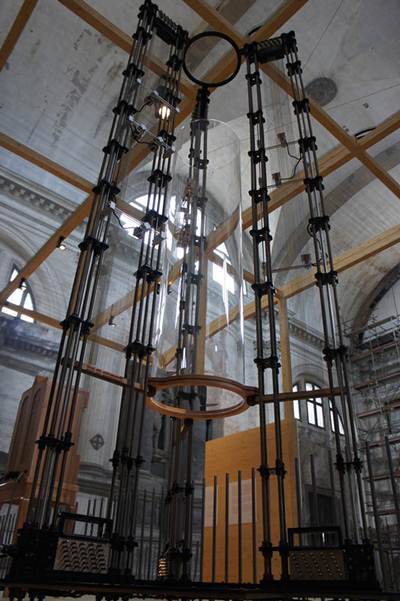
Cordiox Mexican Pavilion at the Venice Art Biennale 2013 Installation 2013, San Lorenzo Church, Venice, Italy | El Universal
***
VAB 05: Tania Tovar Torres

Tania Tovar Torres is an architect, writer and curator. She is co-founder and director of Proyector, a curatorial platform based in Mexico City devoted to the promotion of architecture research projects. Her practice focuses on alternative methods of architectural production and consulting for research and curatorial projects. She is currently professor at Universidad Iberoamericana and appointed curator of the Architecture Pavilion of the 2019 and 2020 Mexican Design Open. Previously, she worked at the Canadian Centre for Architecture in Montreal and at the Arthur Ross Architecture Gallery in New York. Tania holds a Master's degree in Critical, Curatorial and Conceptual Practices in Architecture from Columbia University and a Bachelor of Architecture from the Universidad Nacional Autónoma de México UNAM.
-
Notes: 1. Prometeo (Prometheus) is an "opera" by Luigi Nono, written between 1981 and 1984 and revised in 1985. Nono scornfully labeled Prometeo a "tragedia dell'ascolto", a tragedy of listening. The premiere of the first version was held at the Church of San Lorenzo in Venice on 25 September 1984. [Fondazione Archivio Luigi Nono ONLUS]
2. Designed exclusively for Luigi Nono’s opera Prometeo, this large acoustic space that can be fully dismantled, offered a chance to experiment with the profoundly intimate, even fruitful relationship that can exist between music and architecture. The traditional concept of the concert hall was revolutionized for the event, turning the space into a huge musical instrument, a resonant box housing the stage, the audience and the orchestra. The structure had to be erected first in the church of San Lorenzo, in Venice, as well as in the disused Ansaldo factory in Milan. [RPBW Architects - Renzo Piano Building Workshop, Prometeo Musical Space]
3. The design came to life in 1984 for the first performance at the deconsecrated church of San Lorenzo, in Venice as part of the XLI Biennale/ Musica, after which the structure was dismantled and reassembled a year later at the former Ansaldo factory in Milan. [RPBW Architects - Renzo Piano Building Workshop, Prometeo Musical Space]
4. Wells, H. G. 1998. The Invisible Man. Wickford, R.I.: North Books.
5. Over the centuries, San Lorenzo was known as a centre for music more so than a church, where celebrated seventeenth-century composer Antonio Vivaldi, performed and rehearsed. The church suffered damages during the Napoleonic War and, in 1810, was deconsecrated and all decorations except the main altar were removed. It closed to the public in 1865 and, in the early twentieth century, underwent a series of archaeological excavations, in search of the remains of Marco Polo. [San Lorenzo, Ocean Space]
6. The installation created by Renzo Piano for Luigi Nono's opera Prometheus in 1984 created "an invisible theatre where the production of sound and its projection into space are fundamental to generating dramaturgy". For Nono, music and sound predominated over images and the written word, as much as the building that served only as background for its stage to open up new dimensions of meaning and possibilities for listening. [La Máquina Sonora, Arquine]
7. The 15th of September 1984 was the last time that San Lorenzo was opened with the final concert performance by Luigi Nono with the architectural, acoustic and scenographic proposal of Renzo Piano. After 28 years of being closed, the old church reopens on August 27th with the inauguration of the Mexican Pavilion for the International Architecture Exhibition of the Venice Biennale, which was on display until November 25th. Mexico reached an agreement for nine years with the Municipality of Venice in order to restore the heritage site and use it as a Mexican venue for the biennials of art, architecture, film, dance, music and theater for the next nine years. [Las Capas De San Lorenzo, Arquine]
8. The Mexican State signed, in July 2012, the contract with the Municipality of Venice to have in comodato the former Church of San Lorenzo for nine years, not only committed to restore the property, but to have a constant cultural programming, allowing the entrance to local public one day a month and acquire an insurance against damages to third parties. [México Se Compromete A Darle Vida A La Ex Iglesia De San Lorenzo]
9. El INBA Excluye A San Lorenzo En Bienal De Arquitectura De Venecia
10. Wells, H. G. 1998. The Invisible Man. Wickford, R.I.: North Books
11. After having recovered with the 13th International Architecture Exhibition of the Venice Biennale (Culture under Construction), the Mexican Pavilion for the 55th International Art Exhibition of the Venice Biennale was opened in the old Church of San Lorenzo (The Layers of San Lorenzo). For this edition, the Mexican artist Ariel Guzik (Mexico City, 1960) was invited, who proposed Cordiox, a complex machine that describes sonorously the environment where it is located, spreading a crystalline, subtle and expansive tonal cadence, which favors an exceptional listening experience. [La Máquina Sonora | Arquine]
2 notes
·
View notes
Photo
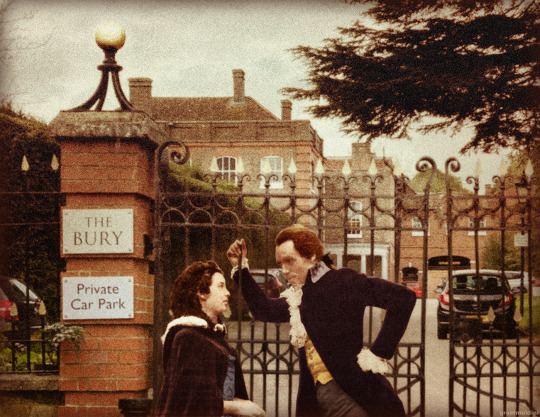
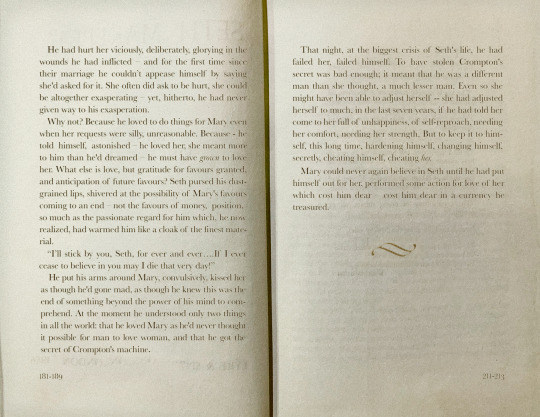
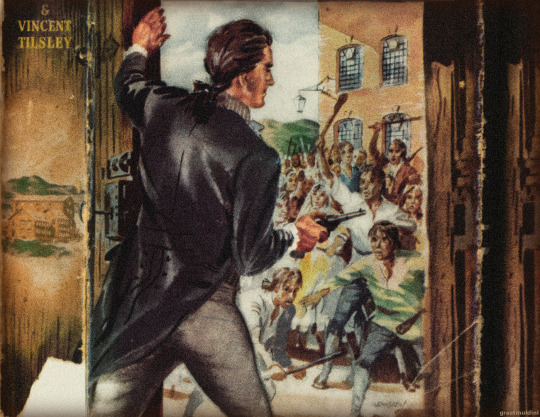
I trust the path I travel is the right one. I've faith to go along it no matter what happens to me.
On Tuesday, 3 October 1955, the picturesque village of Chesham in Buckinghamshire (at the very end of the Metropolitan Line) transformed itself, for one day, into the fictional Lancashire village of Shawcross, where on another fateful day in the year of our Lord 1775 the out-of-work cottage weaver Seth Makepeace encounters the local landowner's daughter Mary Radcliffe.
It happens to be Mary's 21st birthday, a significant date under any circumstances, but she is as yet unaware of the historical dimension of this one particular moment in time as she attempts to pass in her horse-and-buggy a gang of shabbily-dressed workmen mending the village roads. It is a pivotal moment in every sense – she is lifted from her carriage to be safely deposited on the ground beyond the blockage – because the tall young man with the deep-set eyes and the curiously shambling walk who picks her up and puts her down is none other than her future husband.
Far from love at first sight, though, their initial exchange is fraught with tension (“Don’t dare touch me, you wretch!”), but before long they will come to recognize the mutual gain to be derived from what we would call a classic marriage of convenience: Mary, being of age and of eminent eligibility, needs to escape from an arranged union with a foppish aristocrat; Seth, being poor but clever, needs cash to realize his dream of building a modern factory. Mary, too, has big ideas: about social justice and relief of the poor, neither of which will come to fruition if she bows to her family’s wishes.
It takes the urgency of Mary’s situation for both of them to realize that their ambitions, for better or worse, are inextricably linked. Mary is willing to risk the loss of her inheritance; for Seth the worst case involves jail and deportation. The stakes are high, and so are the opportunities, which both of them can clearly see. A period of joyful optimism ensues; the mill is built, the village prospers, and for four years, progress in Shawcross seems unstoppable.
The year 1779 marks a decisive turning point in the fortunes not only of the Makepeace household but in the lives of many people in the village of Shawcross and beyond. Competition among the Lancashire mills is fierce, and Seth is hard-pressed to introduce ever more efficient means of production. To stay ahead of his rivals, Seth reckons he must either cut wages or turn out a superior product. A solution offers itself in a new device for mass-producing stronger and finer yarns, but the inventor is unwilling to reveal his secret. Seth blames his wife for the failure of the deal, and in a fit of drunken bravado Seth turns criminal and steals what he needs.
That same night, Seth returns to Radcliffe Hall with a troubled conscience, almost ready to confess his crime to the one person he has sworn never to hurt, but Mary’s own distress prevents him from adding to her troubles. It is this moment of supreme vulnerability - and supreme betrayal - that will come back to haunt them both as they must deal with the human dimension, and the human cost, of the historical forces at work. Seth goes on to do what he knows must be done: he copies the mechanism and puts it to work without acknowledging the inventor’s contribution. As long as he can protect Mary from what he knows must be done, his wife remains blissfully unaware and passionately supportive of her husband’s undertakings.
To prove the point, Mary can at last reveal to Seth that she is pregnant, their future happiness assured – when they receive a visit from Mr Sidebottom, inspector of patents, who in his turn reveals to Mary and the entire family that the machines upon which their wealth has been built have in fact been used without license. The revelation comes as a shock not so much for its legal implications as for the catastrophic breach of trust Mary feels has been committed by her husband, and she fears they will not be able to heal the rift between them without major sacrifices. Here, modern audiences may draw different conclusions from the one offered and presumably endorsed by the original authors in the 1950s.
The American War of Independence eventually makes itself felt in a shortage of raw materials that threatens to close down whole industries. The existential threat takes many forms, and in Shawcross angry workers are storming the factories intent on destroying the machines they blame for the loss of their independence, their cotton, and their work. For Seth, too, the emergency is real: if he cannot keep the Mules spinning and the looms weaving, not only will the workers who depend on him lose their jobs, but the Makepeace brand will cease to exist. Having spent vast sums on smuggled cotton, he knows he does not have the capital to start again from scratch: the mill must be saved at all costs. In a mad dash to Liverpool Seth hopes to hopes to catch up with the next ship from the Colonies before his rivals can lay their hands on the precious cargo.
Meanwhile, a heavily pregnant Mary appeals to the enraged villagers to put their faith and their trust in her husband: he will do whatever it takes to find cotton and keep the mill going. Husband and wife are reconciled over the humane treatment of the factory workers, on which they both agree, but they remain divided over what their common interests are, and the lengths to which Seth will go to protect what he considers to be his interests. Ultimately, the mill is saved without loss of life and the rioters are captured, but Mary dies in giving birth to a healthy baby boy. With the future of his son and that of his factory at stake, Seth has no time to grieve. He knows what he must do - what Mary would have wanted him to do: even before he goes to see his new-born son he orders the prisoners released. The rebellion now a thing of the past, it is the value of the former rioters as a reliable workforce on which the Makepeace mill and the Makepeace dynasty will depend.
After the initial marriage of money and talent, followed by the uneasy truce between opportunism and idealism, finally we have, in Seth, the synthesis of capitalism and compassion: the idealized principle of progress. In his uncompromising pursuit of that principle, Seth has an uncanny doppelganger whose fanatical obsession with all or nothing ultimately ends in tragedy. Unlike Pastor Brand, however, Seth is not a tragic figure. He is not reminded of his hubris and of his mortality in one final moment of self-reflection - no space is reserved for such precious introspection. But if Seth and Mary represent “history on a human scale,” the reverse is also true. Seth is being elevated to a larger-than-life principle that transcends the fate of any single human being. And yet it is the very humanity of the flesh-and-blood character that would have made his exploits accessible to millions - courtesy of his real-life doppelganger.
Reviews of the play were favourable and appear to have been born out by the viewing figures. The positive response warranted a repeat twelve months later, and loyal audiences rewarded with an extended version of Seth’s on-screen exploits in book form. Momentous historical events intertwine with the minutiae of mechanized spinning and weaving, but the resulting tapestry of life in turbulent times would be incomplete without the human element of personal triumph and tragedy – which we can experience, albeit vicariously, through the domestic struggles of the fictional protagonists. The Ruthless Destiny is thought to be one of the “lost” productions from the BBC’s early days. We have no record of any surviving copies, and no script to help us compare the televised version with the still widely circulating novel. In it, Seth Makepeace is described in such detail as to suggest his physical appearance, bearing, and behaviour were closely modelled on the actual performance, as indeed seems to be the case for the cover illustration of a ferocious Seth determined to defend his mill, and his future, by any means necessary.
#Patrick McGoohan#Clare Austin#The Ruthless Destiny#Seth Makepeace#written by#father and son#Frank and Vincent Tilsley#Frank first reviewed#a performance of the Sheffield company in 1948#Vicent went on to write#not one but two episodes of#The Prisoner#Chimes of Big Ben#Do Not Forsake Me Oh My Darling#neither of which I find particularly appealing#as they are strangely at odds with the point I believe the Prisoner is trying to make#and which their own novel employs so brilliantly#by turning the protagonist into a principle#both Seth and the P are larger than life figures#but those two episodes insist on#depicting the P as a very ordinary man with ordinary relationships#think about it#I do very little else apparently#Ohhh Seth#What a loss this is to womankind
13 notes
·
View notes
Text
I’ve been thinking about axolotls lately — specifically, about how they experience neoteny, the delayed development of adult traits. In the case of axolotls, it means that unlike most salamanders, they don’t undergo metamorphosis under normal circumstances. In simpler words, you could say that axolotls don’t grow up.
And that struck me as an interesting parallel (or perhaps foil) to a number of different characters from Gravity Falls whose feelings about “growing up” are explored within the show — most obviously Dipper and Mabel, but I’d argue Bill Cipher as well. I don’t think the writers necessarily chose to include the Axolotl for this reason (if anything, it was probably just for the association with Xolotl, the Aztec god of twins), but I think I’m going to take a crack at interpreting it anyway.
When I talk about Gravity Falls, I often find myself approaching character analysis from the perspective of foils, of characters written to contrast so that their contrasting traits are highlighted — and who better to contrast with the Axolotl than Bill Cipher? Both are indescribably ancient, powerful entities, but as Ford speculates in the blacklight journal, they’re also opposites: one firmly aligned with good, and the other with evil.
If beings of such evil can exist in the cosmos, could there possibly be other beings of equal and opposite good?
But despite those stark differences, there's one more piece of common ground they share, one more point of similarity from which they diverge: that notion of not growing up.
When asked in an interview why Bill was so mad at the world, Hirsch replied:
Why is Bill so mad at the world? I think there’s a lot of people where you can ask, “Why are they so mad at the world?” I think Bill is angry at the world for the same reason that anyone sometimes can get mad at the world. Everyone has days where they don’t get their way, where you have to go to bed early or you have too much homework to do or you can’t eat the candy that you want or you miss your favorite TV show and, in those moments, you just want to tear the whole world down.
Bill is a character who has been around for countless billions of eons, but he hasn’t grown up in that time. He’s a character who has accumulated many frustrations, many moments of destruction like that, and they’ve built up over time. Now he’s decided that he wants a world where there is no homework, where there is no bedtime—where you can eat any candy you want, and you can do anything you want. But because he is such a crazy guy, when he does anything he wants, it turns out to be terrifying. So I think little frustrations over thousands of years have built him into a sort of spoiled brat. And he takes it out on the world, and it’s up to our heroes to finally teach him some rules.
Bill is ancient yet immature, so powerful that he expects he can tear down any rules that stand in his way — and when he can’t, he grows incredibly angry.

[Image description: Bill has an angry expression as he looks through a hole in the roof of the Fearamid, having just seen his Henchmaniacs being stopped from leaving Gravity Falls.]
When he realizes he’s trapped in Gravity Falls, he throws a violent tantrum, and in the deleted scenes, he even takes out his anger on the Henchmaniacs. Bill is every reason why one should grow up, everything one should outgrow: the childish selfishness, the lack of emotional maturity, the throwing a tantrum every time things don’t go your way, the desire to tear the whole world down in response to the injustices (perceived or real) that it throws at you.
Then on the other hand, there’s the Axolotl. It exists in the time and space between time and space, in a childlike, unmetamorphosed form that transcends the flow of time itself — practically the epitome of eternal youth. But that said, the Axolotl is a benevolent god, and its way of “not growing up” couldn’t be more different from Bill’s.

[Image description: Picture from the Time Pirates’ Treasure book. Dipper and Mabel are wearing space suits and helmets and floating in a dimension of pink and blue clouds. They face the Axolotl, who takes up most of the page as it floats among in the clouds and smiles at them.]
The Axolotl is silly, harmlessly and delightfully so. In an often (but understandably) overlooked detail of a heavily analyzed secret page, it offers Dipper and Mabel a beanbag chair, and it laughs as Mabel calls its poem beautiful but a little wordy.
It teases, but only in the most harmless ways, like counting Mabel’s question about whether it’s a salamander or not as the one question she’s allowed to ask it, or asking Dipper and Mabel their names when it’s suggested to already know Dipper’s name is Mason — unlike Bill, who would gleefully mock Ford for his polydactyly and role in Weirdmageddon, and Dipper for his time as Bill’s puppet and (perceived) inability to fight against a force like Bill.
The Axolotl is an almost inherently absurd and whimsical animal, yet it’s also completely gentle and nonthreatening. It represents the childhood joys that society, on an arbitrary basis, deems unacceptable for adults: the silliness, the optimism, the harmless fun.
Or, as Stan would say:
But just because you're growing up doesn't mean you have to grow up, you know? I mean, look at me. I'm pushin' seventy and I still eat ice cream for dinner!
Bill represents the side of childishness that should be matured out of, and the Axolotl represents what should be retained.
(Again, I doubt this was why the crew included the Axolotl in the first place, but it really does mesh beautifully into the show’s themes.)
369 notes
·
View notes
Text
COVID-19 LIFE
18 May 2020
How can it be 12 days since I last posted? It must be the distraction of improving weather, the amount of time I am spending on the garden, and getting ready to enjoy the outdoor season: bringing all the outdoor furniture up from the basement, cleaning the porch, patio and deck, putting covers back on all the cushions, moving all the plants that have been hibernating in the sun room out of doors; ferns for the urns on the front steps, and hanging from hooks above the balustrades on the porch, potted palms next to the wooden furniture facing Pearl street. There are the big self-watering planters filled with semi-tropicals on the deck off the sun room and the giant urns on the blue-stone patio. New plantings in the bare spots in the flowers beds, potting a new lime tree, an on-going losing battle with crabgrass and other unworthy competitors to my lawn. I could have a booth selling dandelion leaves for salad at the Wall Street farmer’s market on Saturday morning if I had the time. Re-seeding bare patches under the copper beech tree and the corner near the vegetable patch, seeding herbs and greens in tiny compostable pots that have to be misted twice a day. Cutting away dead leaves and growth from everything and moving the potted plants from beneath the living room windows to their appointed positions out of doors. Ahh....

The weather had been so cool, damp and dreary, that I had to take matters into my own hands and say enough is enough, that it was about time we moved from bare hints of spring to full on spring mode on May 14th, mainly to keep Marco from packing his bags and moving back to Tuscany, where temperatures are already well into the high seventies and eighties. Temperatures here rose as ordered. We hit 80 a couple of days ago which has delayed Marco’s imminent migration. I even enjoyed a pitcher of iced tea!

Meanwhile, in the wider world, 90,000 Americans are dead, and there have been 1,400,000 confirmed cases of the virus. 36,000,000 Americans have filed unemployment claims (Marco and I are not eligible) and armed civilian militia have overrun the Michigan state legislature and shut down Oregon’s demanding that the governments re-open the economies. Who are these people? They are clearly a small but vocal minority of the disparate groups of supremacists, right wing Christians, and hard line second amendment defenders who are being encouraged by the man in the white house (note to my great-grandchildren: many people in these times refuse to even speak the name of the current resident of the White House. Something we borrowed as a form of protest from the Harry Potter novel series where people were afraid to even mention the name of the antagonist -- Voldemort.) We’re not ‘afraid’ to mention his name, we just feel that he shouldn’t be given any form of legitimacy, not as a man, and certainly not at as a president.
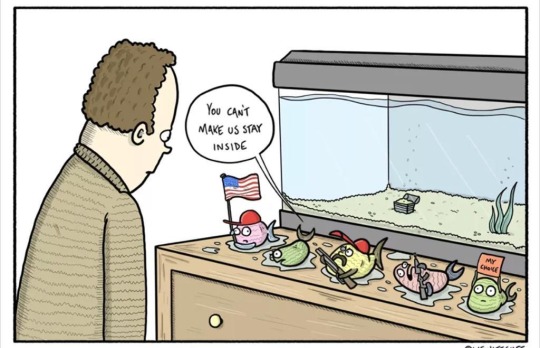
Closer to home, here in Kingston, NY, a barber in a hipster-retro shop on John Street, has been cutting hair on the sly, in defiance of the shutdown, and has been diagnosed with the virus. Officials are searching for anyone who might have had their haircut by him (eye roll). On the brighter side, Liberato (Marco’s niece's fiance was finally able to legally open his brand spanking new barber shop in San Querico (Tuscany) this week and is booked solid for two weeks -- 97 appointments. It’s curious that the Kingston barber made international headlines. We heard about it from as far afield as Siena (IT) and Geneva (CH, not NY!) Most people are taking the shutdown seriously, but many are not, and it’s a very divisive topic. One security guard was shot, in Michigan, for telling a customer to put on a mask or leave the store. Another liquor store owner in Flint (Michigan clearly has anger management issues) was shot in the ankle for the same reason. Many people feel that the lock down is a useless exercise, that we should just open up and get it over with. It’s not killing as many as we thought it might, and cases have started to fall off in the worst hit places. But the whole point was to ‘flatten the curve’ to prevent the health care system from getting overwhelmed and to protect the vulnerable. That part has worked. So where do you begin, and how much is enough, to get the economy started again without creating new spikes and hot-spots of the disease and risk overwhelming the hospitals? The scientists argue that it can’t be done safely until we have tested most of the population to get a handle on how many people have already had it. Supposedly, 60% is a magic number for ‘herd immunity,’ above which the virus will slowly die out because it can’t sustain itself in a smaller pool, but that assumes that once you’ve had it, you are immune. The jury is still out on that. So much information, so little reliability. Example: Marco read in the Italian press today that the US had come up with a vaccine and was testing it. Here, however, the medical professionals are saying we are at least a year, maybe two, away from a vaccine. It’s no wonder people are acting crazy. Anyone can pretty much find someone out there who is saying exactly the thing that appeals to their fears and some of us act on those fears, with the encouragement of the 12-year old in chief, who says he is now taking hydroychloroquine, the efficacy of which is questionable and is said to have potentially harmful side effects. A couple of months ago, a couple in Arizona took it after he touted it. The husband died and the wife was hospitalized in serious condition. Well, let’s hope he manages to kill or incapacitate himself soon.
That’s plenty on that topic. I don’t know if it is because we are safely ensconced in Kingston in a big house surrounded by lawns and stone walls and flowers that I don’t feel particularly under threat by the virus. But at the same time, I don’t feel the loss of human contact (other than with Cole, Ashe and Carter and the hugs). My time is my own, and I’m enjoying finding ways to fill it -- cooking, reading, planning for reopening my hospitality locations, gardening, studying, watching movies.... My biggest fears, really, are economic. When this is over, what will my investments be worth, what will the townhouse in Brooklyn be worth, how will I support myself, help Marco, and leave something to my son and grand kids when I go? Up until now those were not serious issues for me.

I do miss eating out in places where I know people or places where the food is particularly transcendent, but cooking at home and really investing in keeping food interesting, has been a pleasant challenge. And as I settle in to lock down -- it’s been two months now -- I find I am seeking less amusement in martinis, mushrooms, and space cookies, and more in reading, writing, studying and cooking and actually having a schedule for those activities. I also love the efficiency of online visual visits, both personal and for study and business. I’m staying in closer contact with so many of my friends than I did before lockdown. We have a call tonight at 7 p.m. with Joe and Vicki in LA which I am looking forward to, and we are doing a weekly family call on Sundays with the kids, Roy and CT in Hawaii, Maud in Brooklyn, Hedy and Firth and M and me here in Kingston.

Hawaii, by the way, is pretty safe. And here, in Ulster County, we’ve had fewer than 40 deaths and 1500 cases. And considering how many people like me have fled from the city to Kingston, I’m surprised it’s not higher. East Hampton, for example, was a hot spot because of all the rich NYC types that have homes there and left the city. Sorry, sorry. I promised to stop. Times article says that wealthier neighborhoods in NYC have lost 40% of their population! I’m so glad the kids are at our place to keep an eye on things. And Marco’s finding a rhythm, too. Check it out.

I finally plodded though to the end of Thomas Campanella’s book, “Brooklyn: The Once and Future City”. It was very, very informative, even if many parts of it would be far more interesting to civic planners and architects than to casual readers, but it really did put a lot in perspective on Brooklyn’s economic and social trajectory through nearly 300 years with some interesting segues into geological formations that impact the place still today. Sadly, as interesting and appealing a place as Brooklyn is, very little scholarly work has been done on it’s history. Until very recently, the focus has always been on Manhattan. It did correct a number of my own misconceptions. Importantly, despite the fact that Robert Moses was not thrilled at the design for the proposed Dodger Stadium at the intersection of Flatbush and Atlantic Avenues, it doesn’t appear that he, on his own, could have stopped it. Research suggests that it was the disappearing fan base (fleeing the crime-ridden city in the 50s and 60s) that made the move to LA more an economic decision than has otherwise been speculated. And I’m no fan of Robert Moses. The study group, in the end, actually wanted to put the stadium complex in Park Slope, bordered by Sterling, Bergen, Vanderbilt and Boerum Place. What a disaster that would have been on so many levels!! Not the least of which would have been the United Jet that crashed in that spot in 1960. And the Weisberg’s wouldn’t have been my neighbors for 34 years because their house would have been razed.
Other non-essential slightly amusing details. Deer ‘resistant’ plants are not deer ‘proof’. And our herd doesn’t seem to be made up of fussy eaters. So, we are frustrated by the number of our plants that are being ravaged. Apparently, based on an internet search, Marco has discovered that piss and cayenne pepper are good home garden deer deterrents! Well... I am putting it to the test with a mixture of BOTH. I’ll keep you posted on results. (I won’t go into detail on how the mixture is obtained/prepared, interesting as it may be.) Hungry? Peanut butter, honey and banana -- not since I was 10 years old. Think I’ll write a kids’ Covid cookbook!

1 note
·
View note